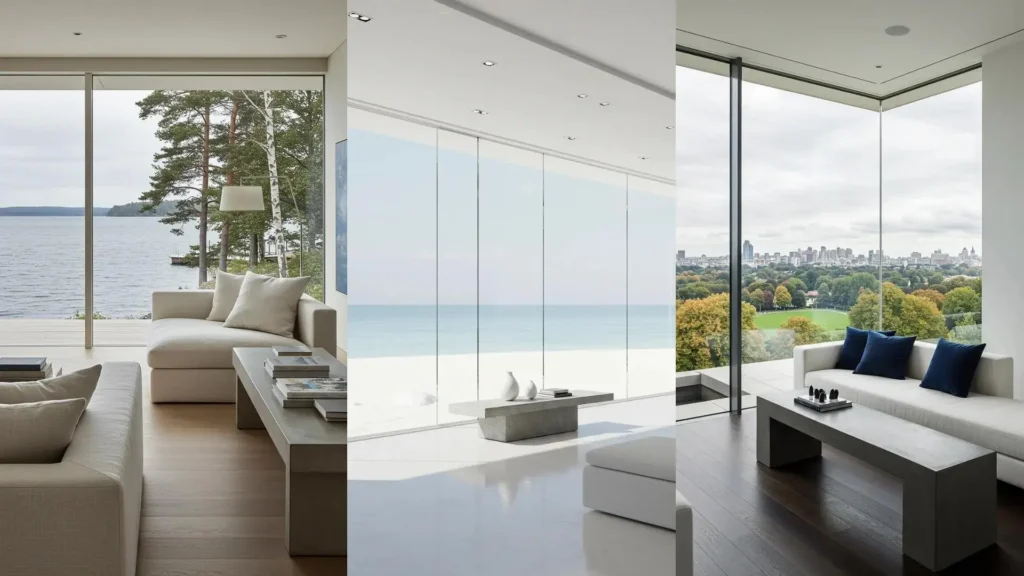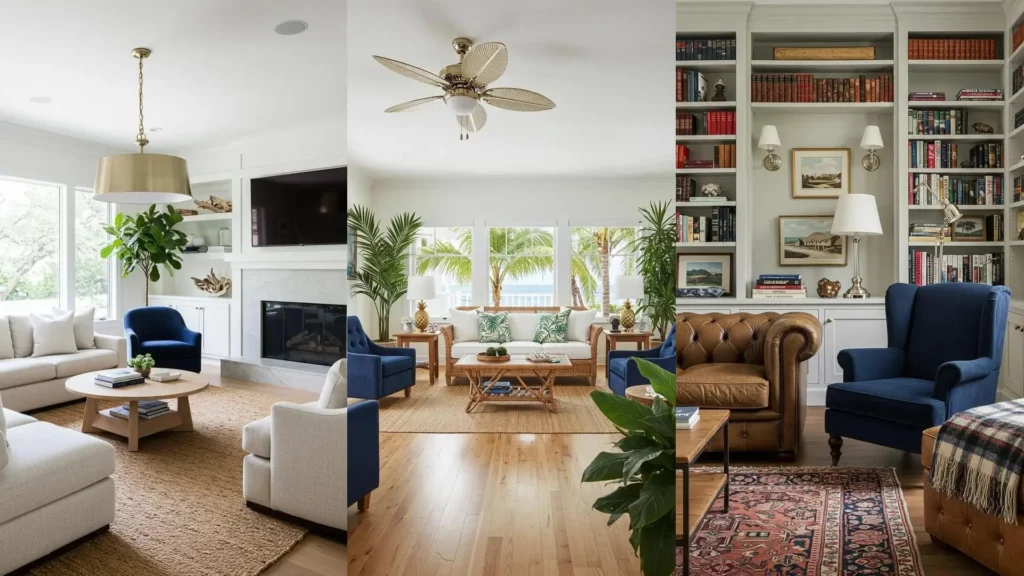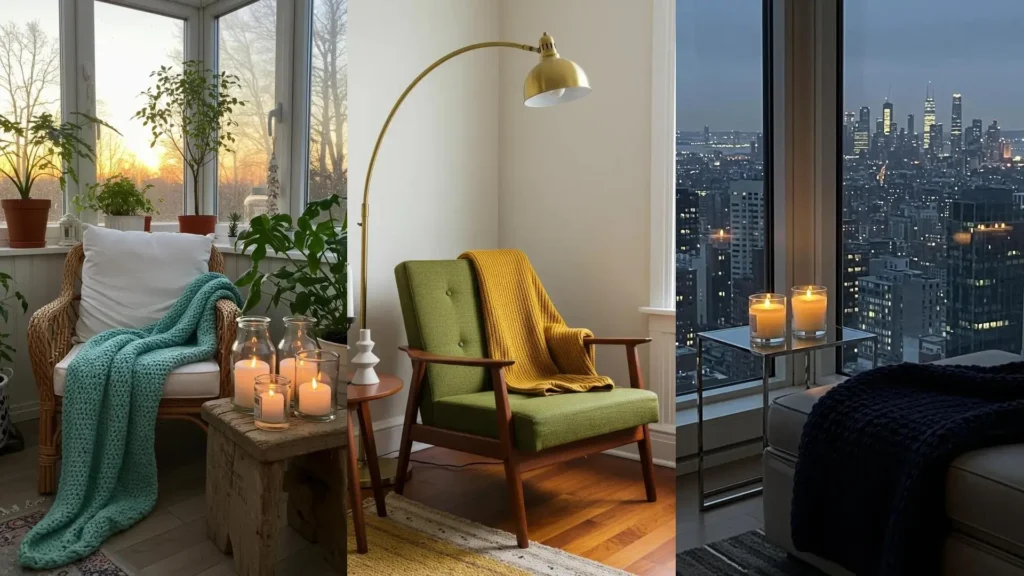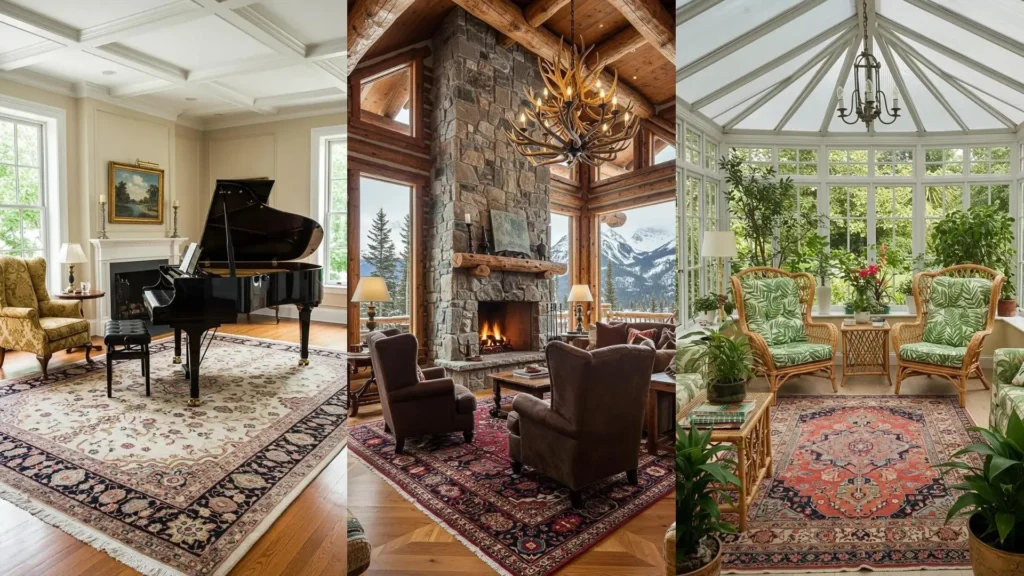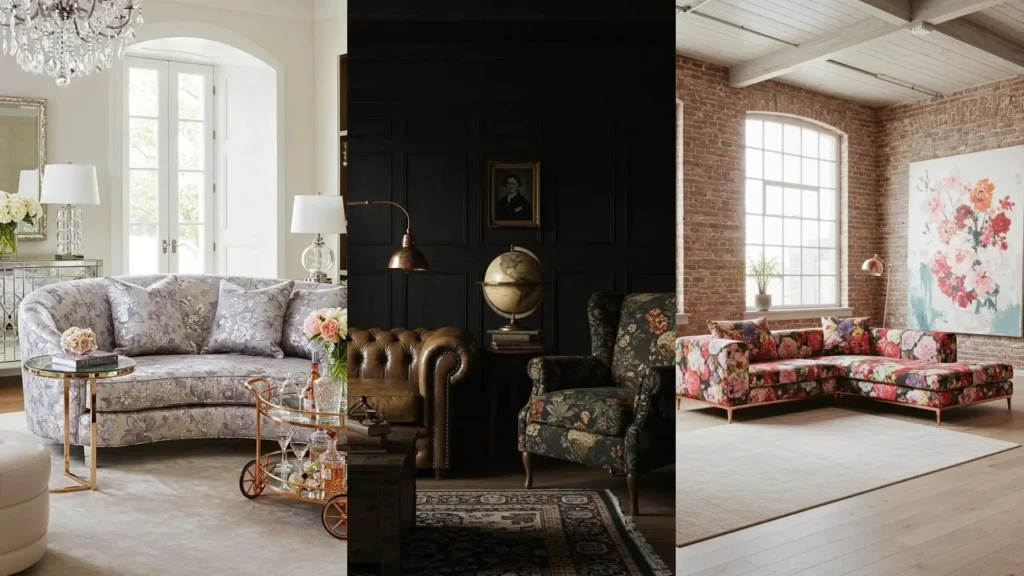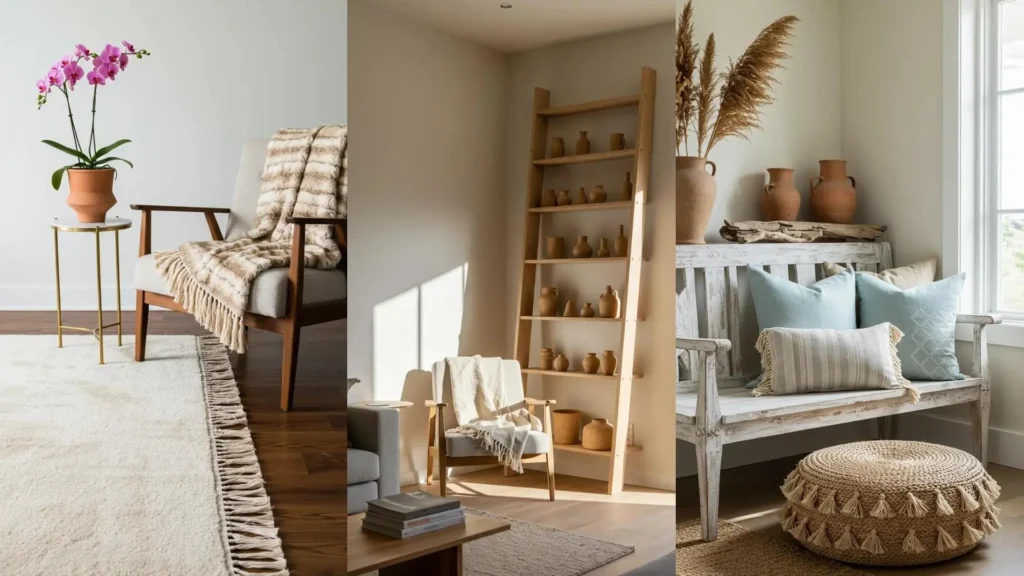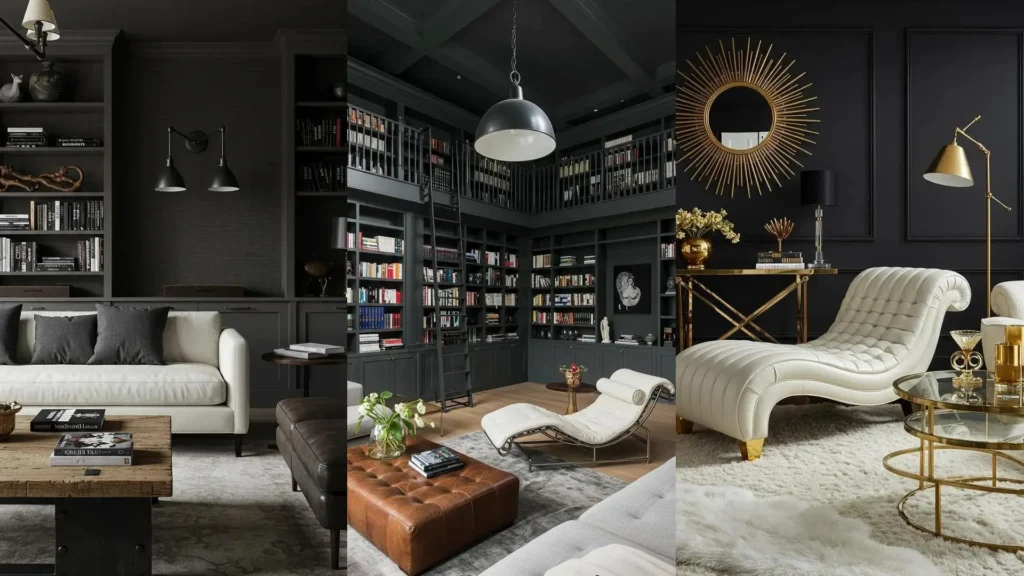There is a unique sense of calm that comes from a space that is both open and grounded. It’s a feeling you might be searching for in your own home—a way to connect with the world outside while cocooning yourself in quiet elegance.
This isn’t about chasing a stark, cold version of minimalism. Instead, think of it as a thoughtful reduction. By focusing on the powerful interplay between expansive glass and solid, raw materials like concrete, you create a backdrop for your life that is intentional and serene.
Here, we explore how this combination works, not as a rigid rule, but as a guiding principle. You’ll find ways to adapt these ideas to your own rooms, proving that a refined contemporary aesthetic is not only beautiful but deeply livable.
Unify Space with a Low-Profile Horizon
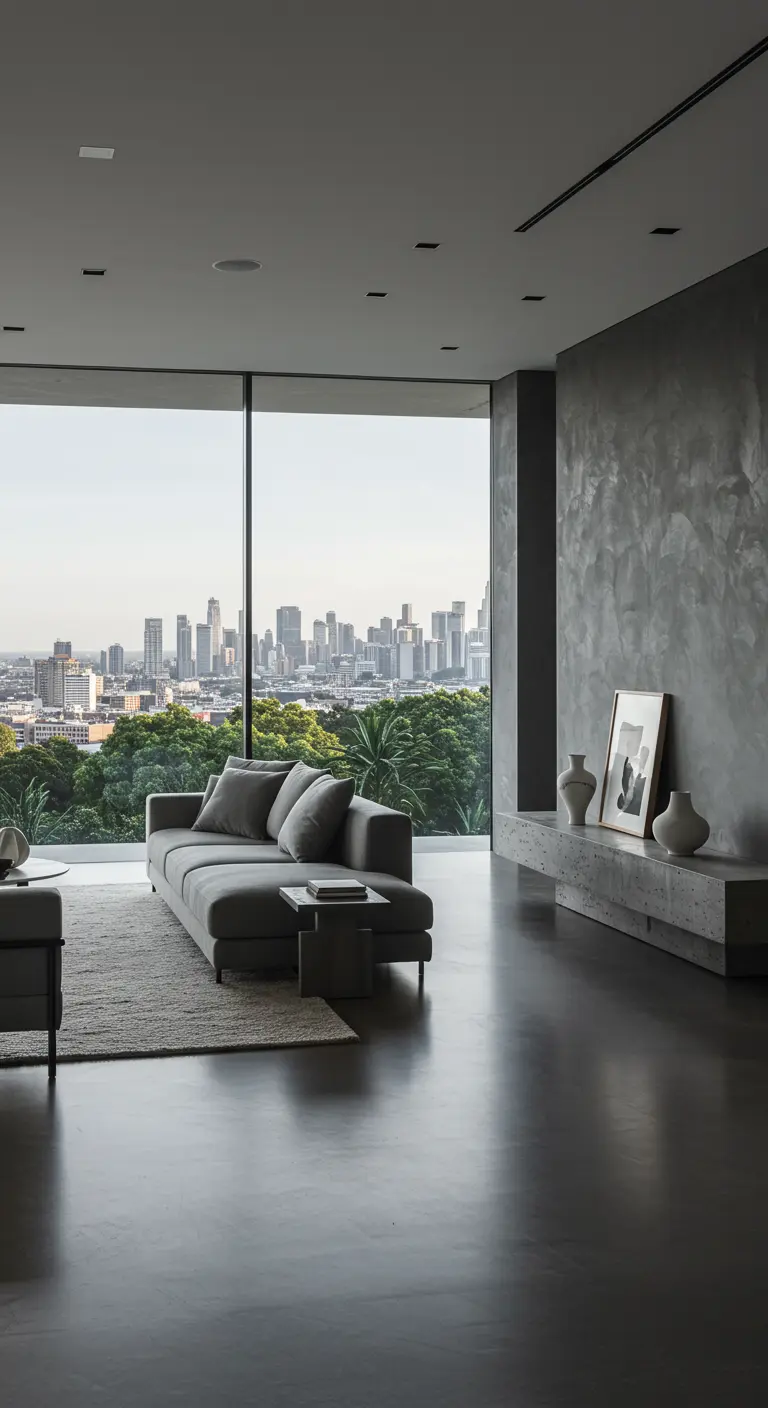
When your room has a commanding view, the goal is to complement, not compete.
Use a long, low concrete console to create a continuous line that grounds the room without interrupting the sightline to the cityscape. This acts as a visual anchor, making the entire space feel more cohesive.
Keep the color palette monochromatic. Varying textures—a plastered wall, a smooth floor, a soft rug—add depth and prevent the minimal scheme from feeling flat.
Introduce Warmth to a Minimalist Base
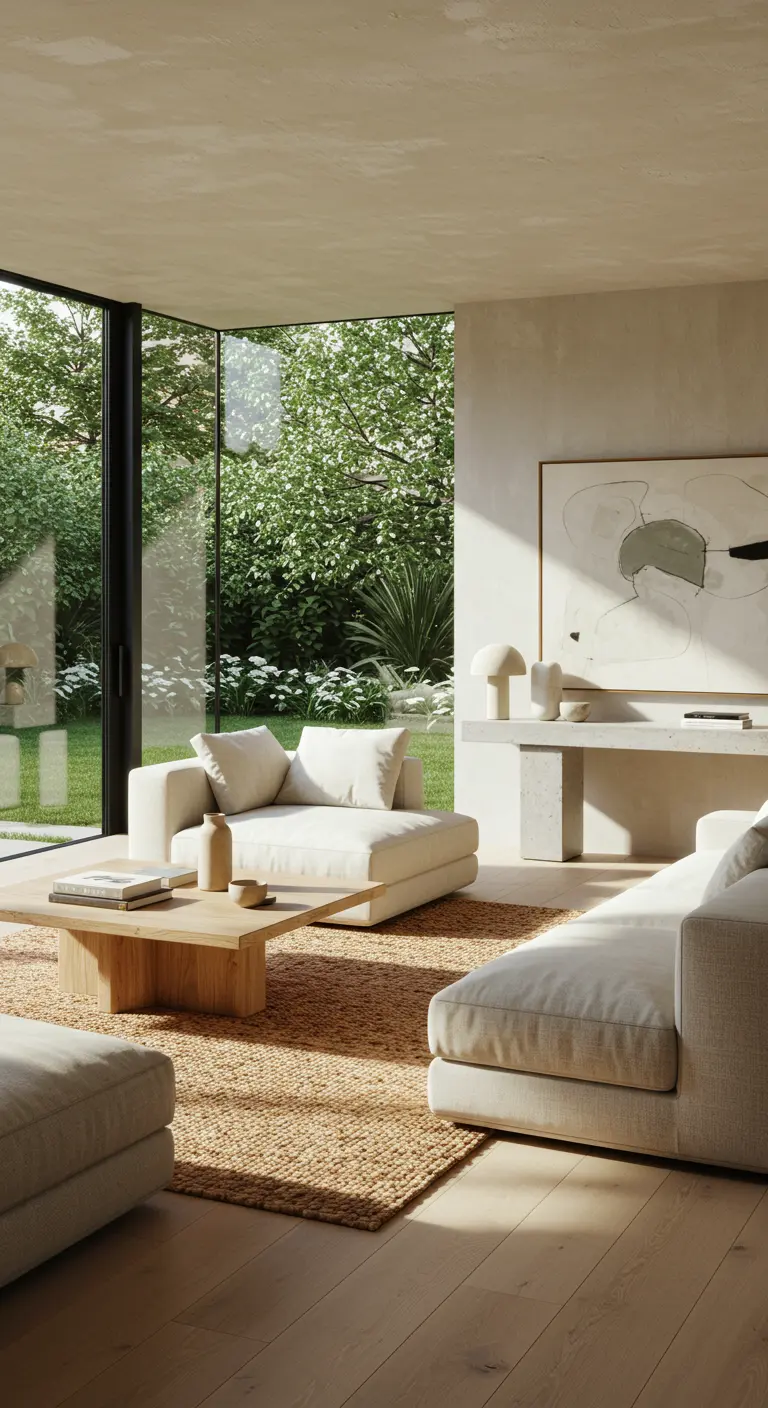
If you fear a contemporary look might feel too cold, the solution is in texture.
Pair a clean-lined concrete console with the organic, tactile quality of a jute or sisal rug. This simple addition introduces a natural warmth that instantly makes the space feel more inviting and comfortable.
Choose soft, overstuffed sofas in light, neutral fabrics to further soften the room’s harder edges. This balance of hard and soft is the key to creating a space that feels both modern and serene, touching on the principles of Japandi interior ideas.
Frame the View with a Dramatic Palette
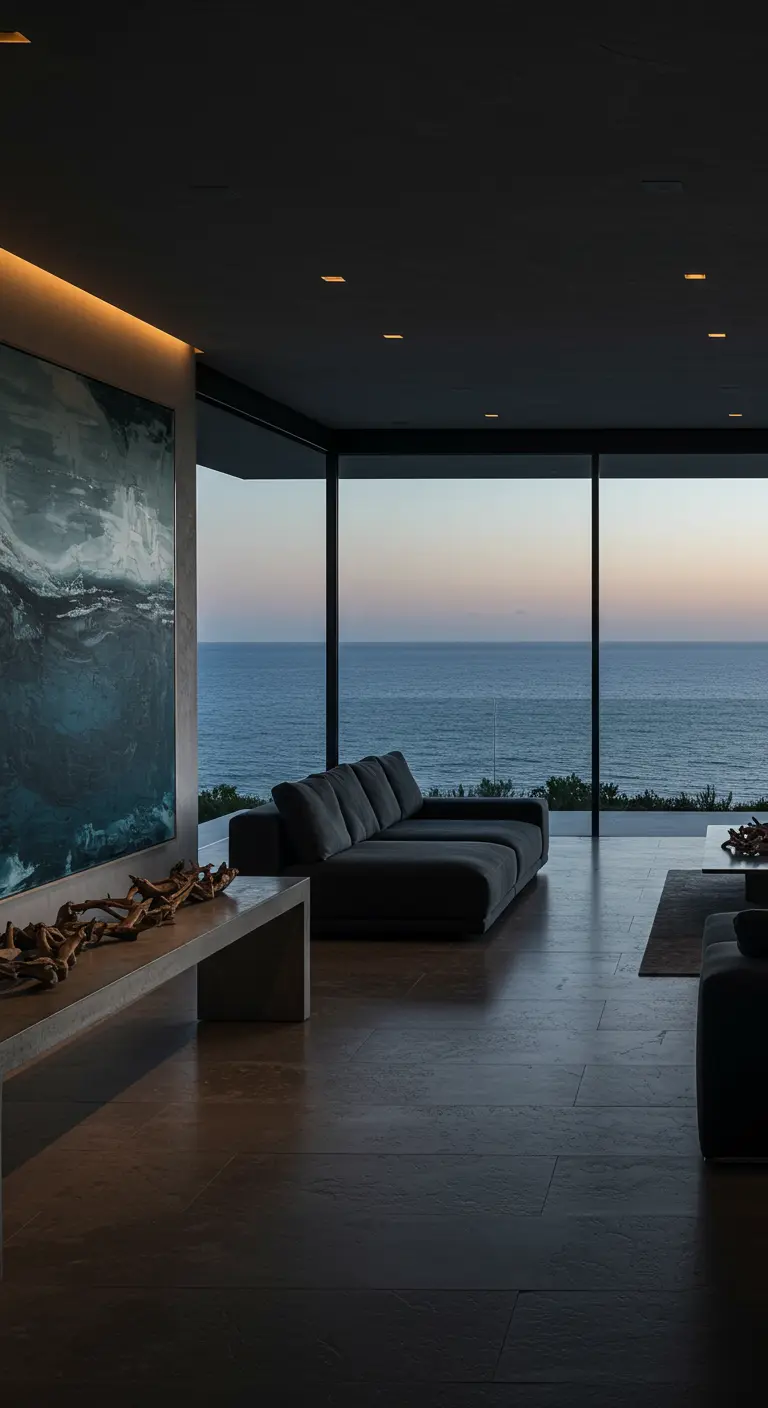
Use a dark interior to amplify the beauty of a natural landscape, especially one as dynamic as the ocean.
By surrounding the glass with deep, moody tones, you create a frame that makes the colors of the sky and water more vivid and impactful. The room becomes a quiet sanctuary for observation.
On your concrete console, display sculptural objects made from natural materials. Weathered driftwood connects the interior to the environment, a fundamental concept in coastal minimalism.
Integrate Lighting for Architectural Depth
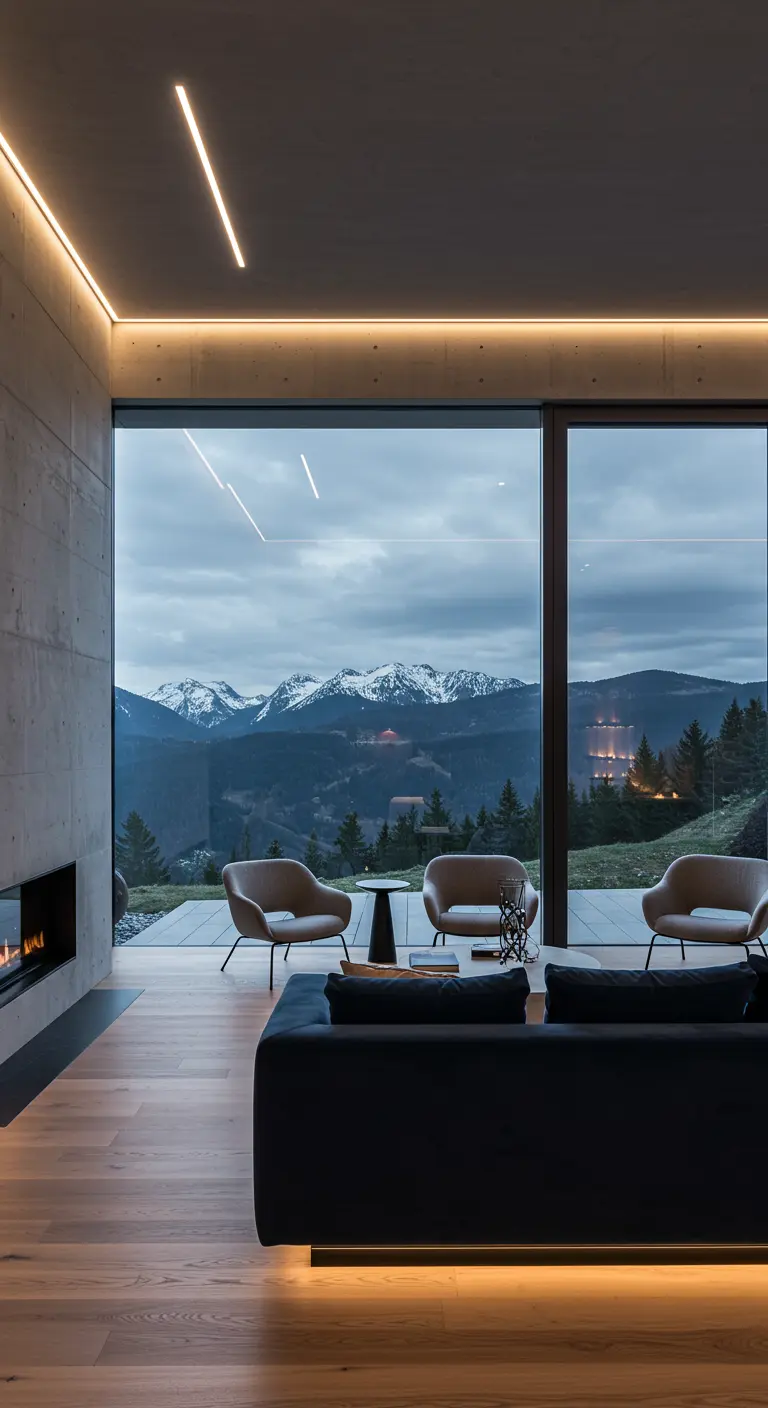
Effective lighting does more than just illuminate; it defines a space.
Install recessed LED strips along the ceiling and beneath key furniture pieces, like the sofa. This technique creates a “floating” effect, adding a layer of architectural sophistication and drawing the eye through the room.
It also provides gentle, ambient light that highlights the texture of concrete walls and polished wood floors without causing glare on the glass, maintaining a perfect view of a mountain landscape, a feature often seen in Scandinavian winter retreats.
Layer Industrial Textures for Character
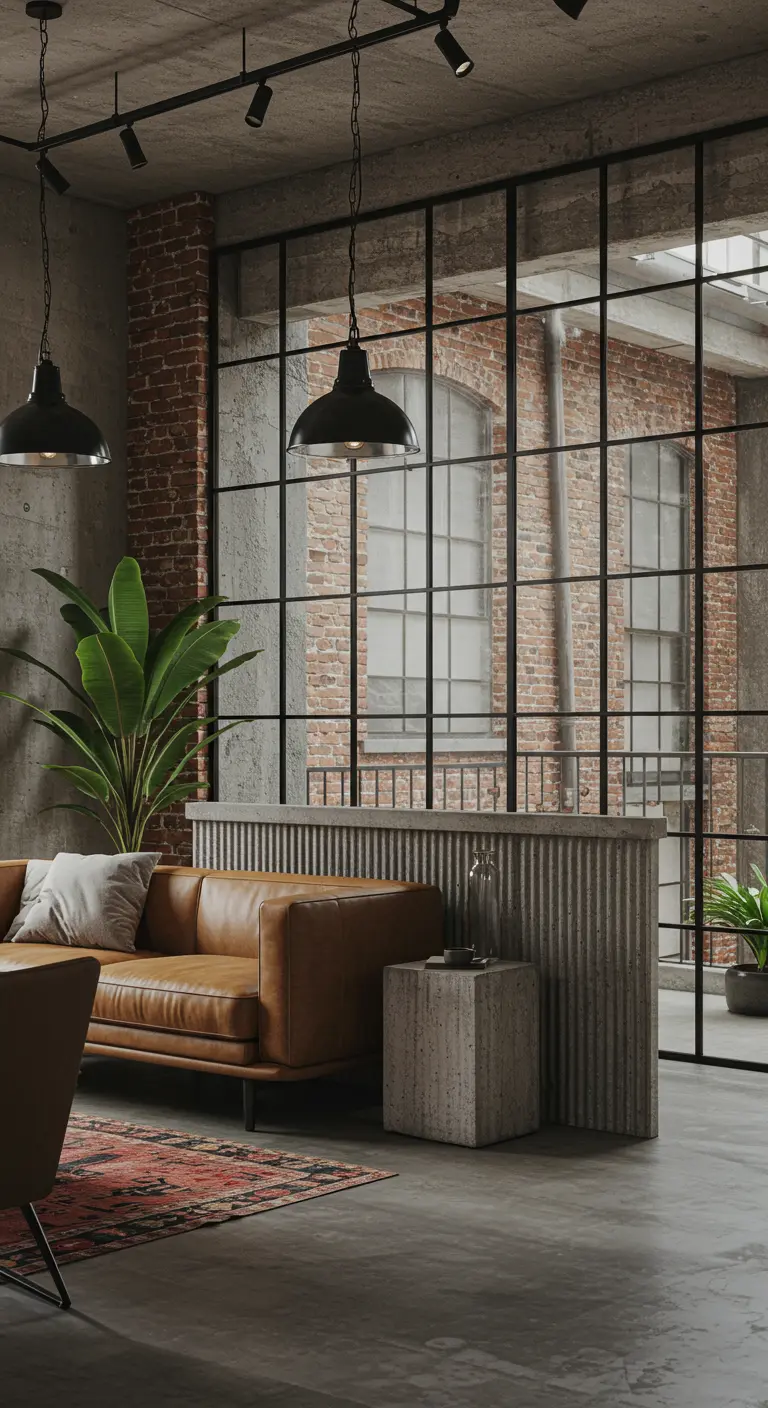
To give your contemporary space a stronger personality, layer materials with a history.
Combine the smoothness of a concrete floor with the rugged texture of an exposed brick wall. This contrast creates a rich visual dialogue and a sense of place, especially in a loft or converted space.
Use a fluted concrete divider to subtly zone the room without closing it off. This adds another layer of texture while maintaining the open, airy feel you get from the large, steel-framed windows.
Embrace the Curve for Softer Modernism
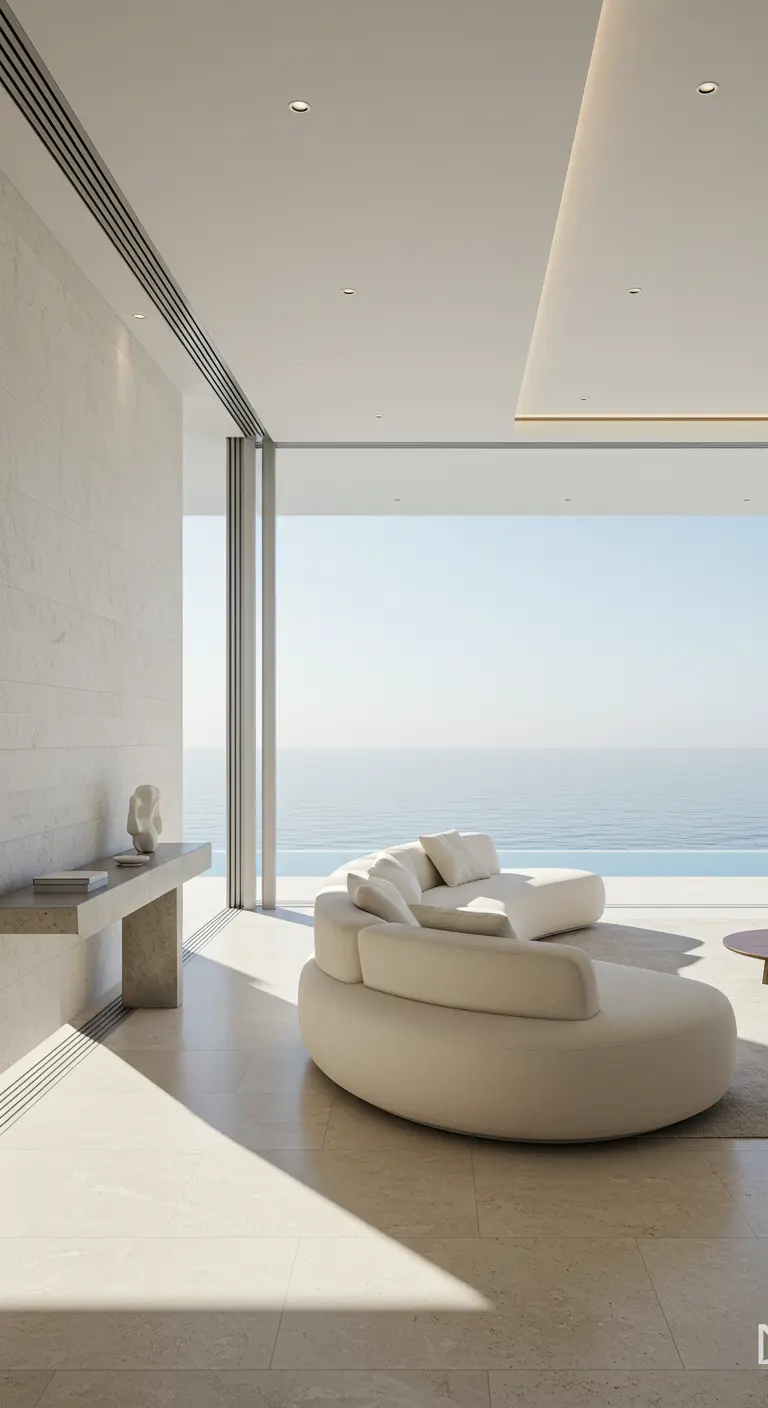
Contemporary design doesn’t have to be all straight lines.
Introduce a curved sofa to break up the angularity of large glass panels and a linear console table. The soft, rounded shape invites conversation and movement, making a large, open room feel more intimate and approachable.
Keep the color palette light and airy—whites, creams, and pale stone—to enhance the sense of openness and reflect the natural light from the expansive sea view, a key part of many luxe, glam spaces.
Connect to Nature with a Cohesive Color Story
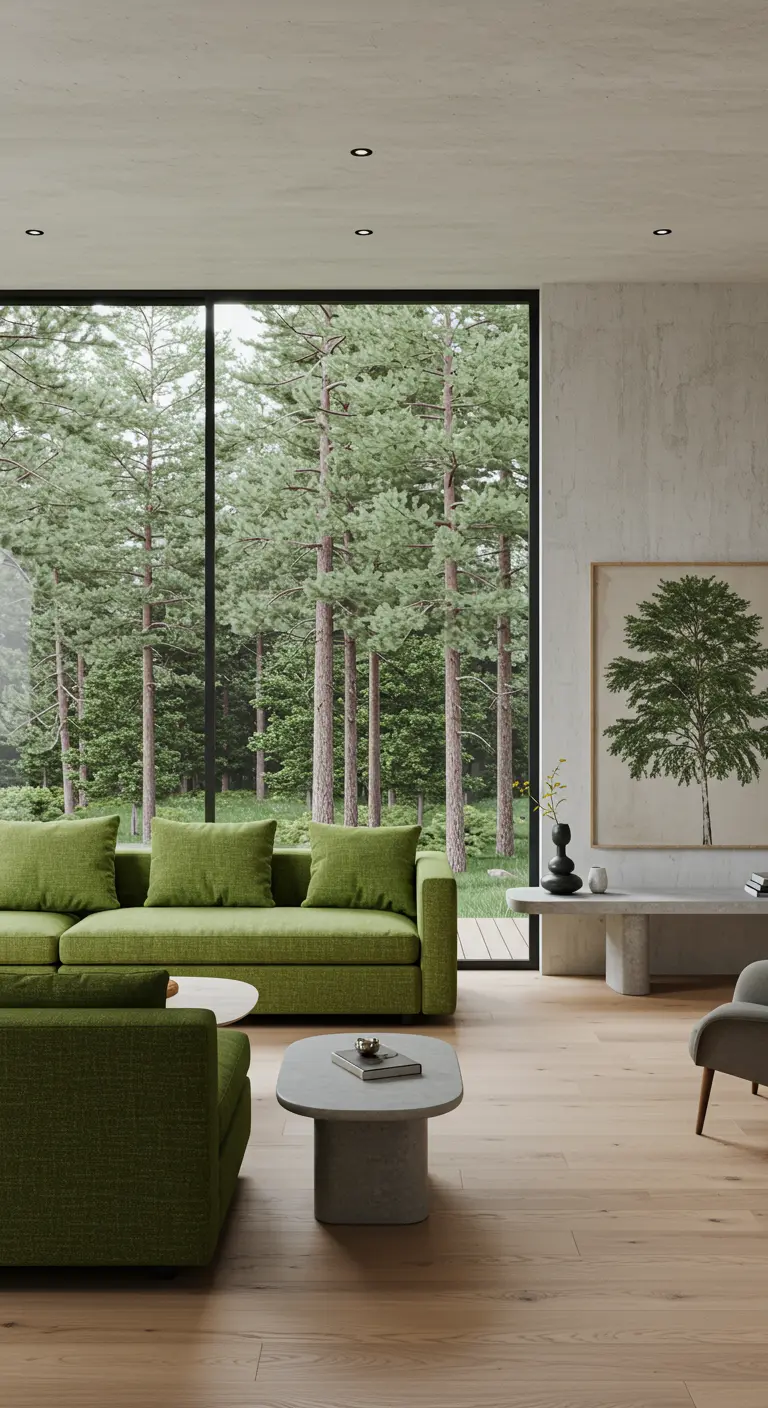
Blur the line between indoors and out by pulling your color palette directly from the view.
If your windows look out onto a lush, green landscape, echo that with a sofa in a similar shade of olive or forest green. This deliberate choice creates a seamless visual flow from the interior to the exterior.
Anchor the space with a neutral concrete console and a simple piece of art that reflects the natural theme. This creates one of those perfect nature-inspired small spaces that feels intentional and calm.
Use a Statement Lamp as Functional Sculpture
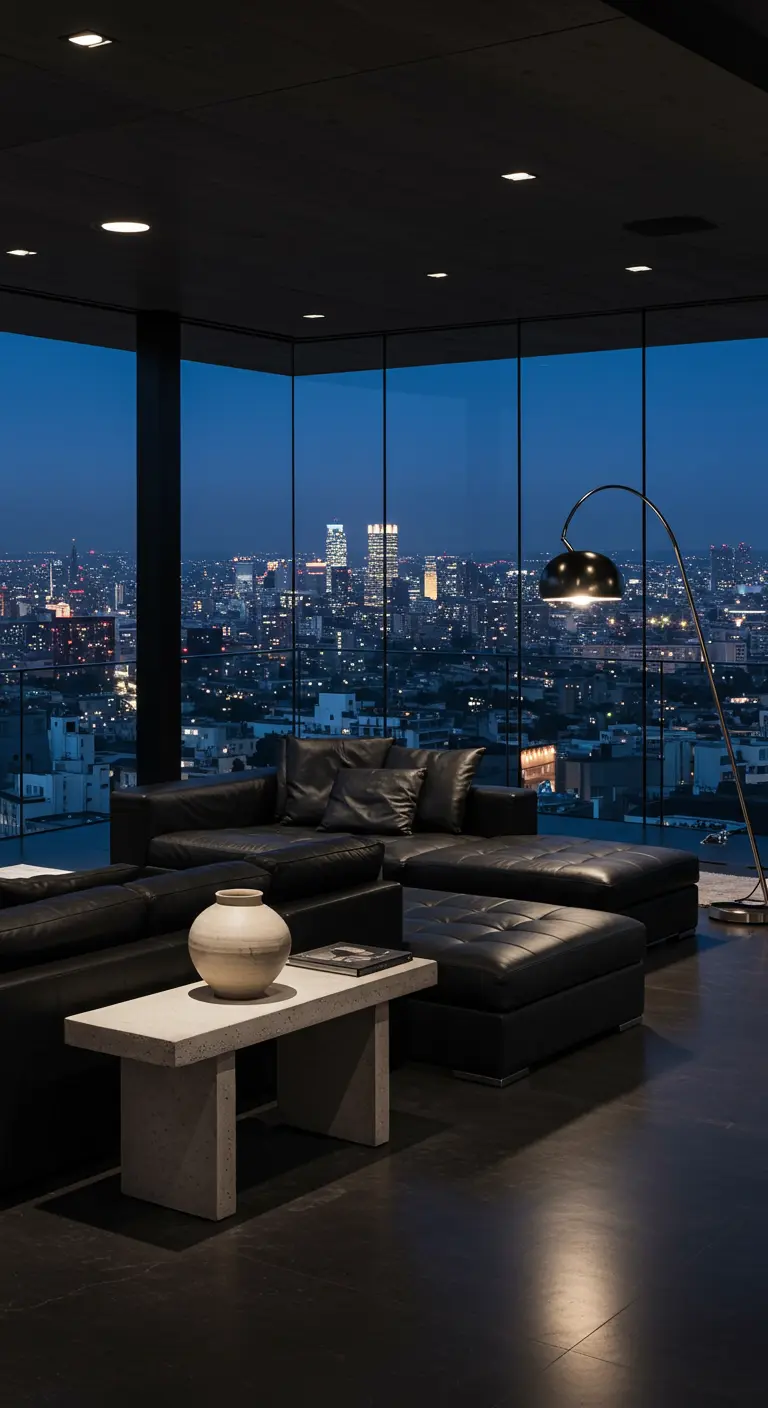
In a minimalist space, every object must have a purpose—and preferably, more than one.
Select a large, architectural floor lamp that functions as both a light source and a sculptural element. An arc lamp, for instance, can illuminate a seating area while adding a graceful, sweeping line that contrasts with the room’s rigid geometry.
Position it to cast a warm pool of light, making a sleek leather sectional feel more inviting for evening conversations against the glittering city lights.
Create Intimacy with Warm, Layered Lighting
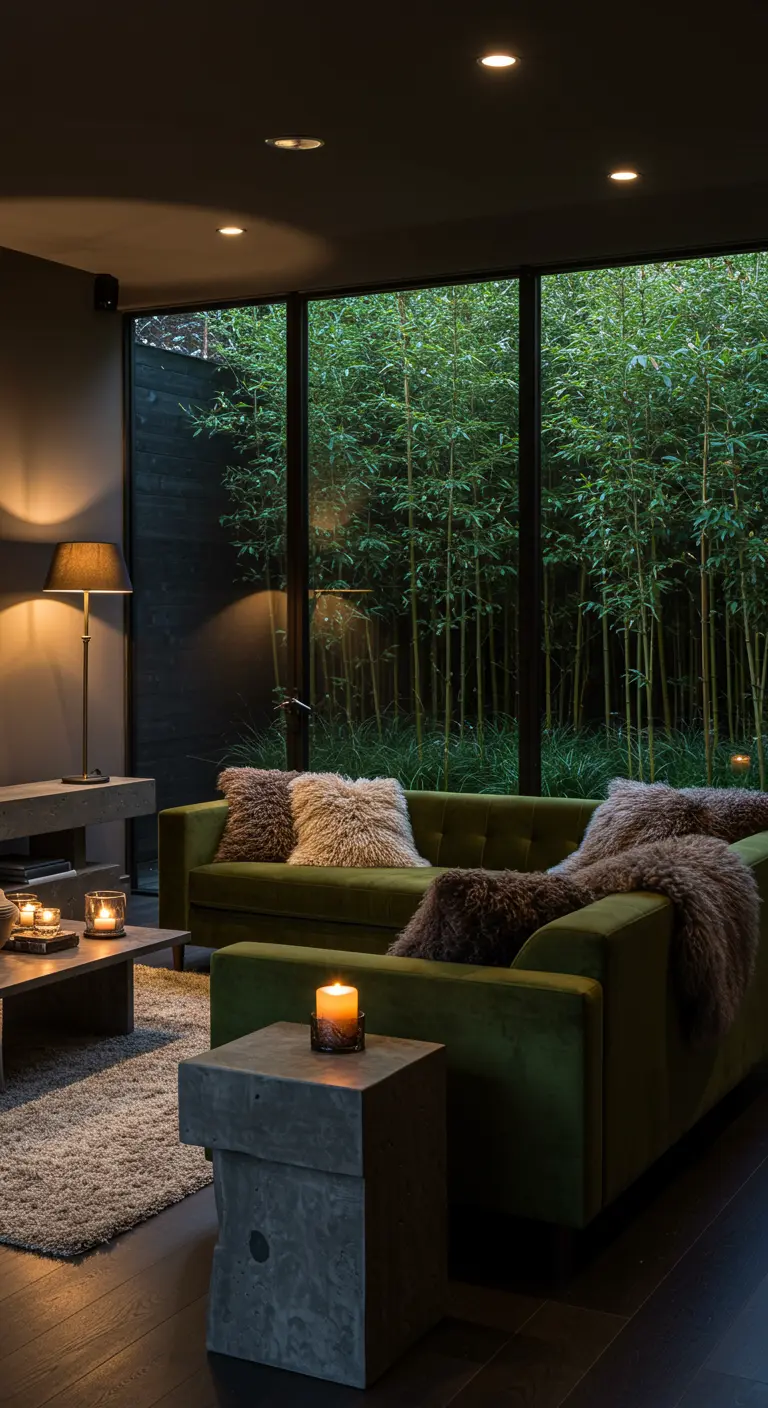
A room with large windows can feel exposed at night. Use lighting to turn it into a cozy retreat.
Instead of relying on harsh overhead lights, create layers of warm, low light. A floor lamp in one corner, candles on the coffee table, and a small table lamp on the console work together to create an intimate and inviting glow.
Drape soft, textured throws over the sofa to enhance the feeling of comfort and sanctuary, transforming the view of a bamboo garden into a private, zen-like backdrop.
Extend a Surface for Ultimate Cohesion
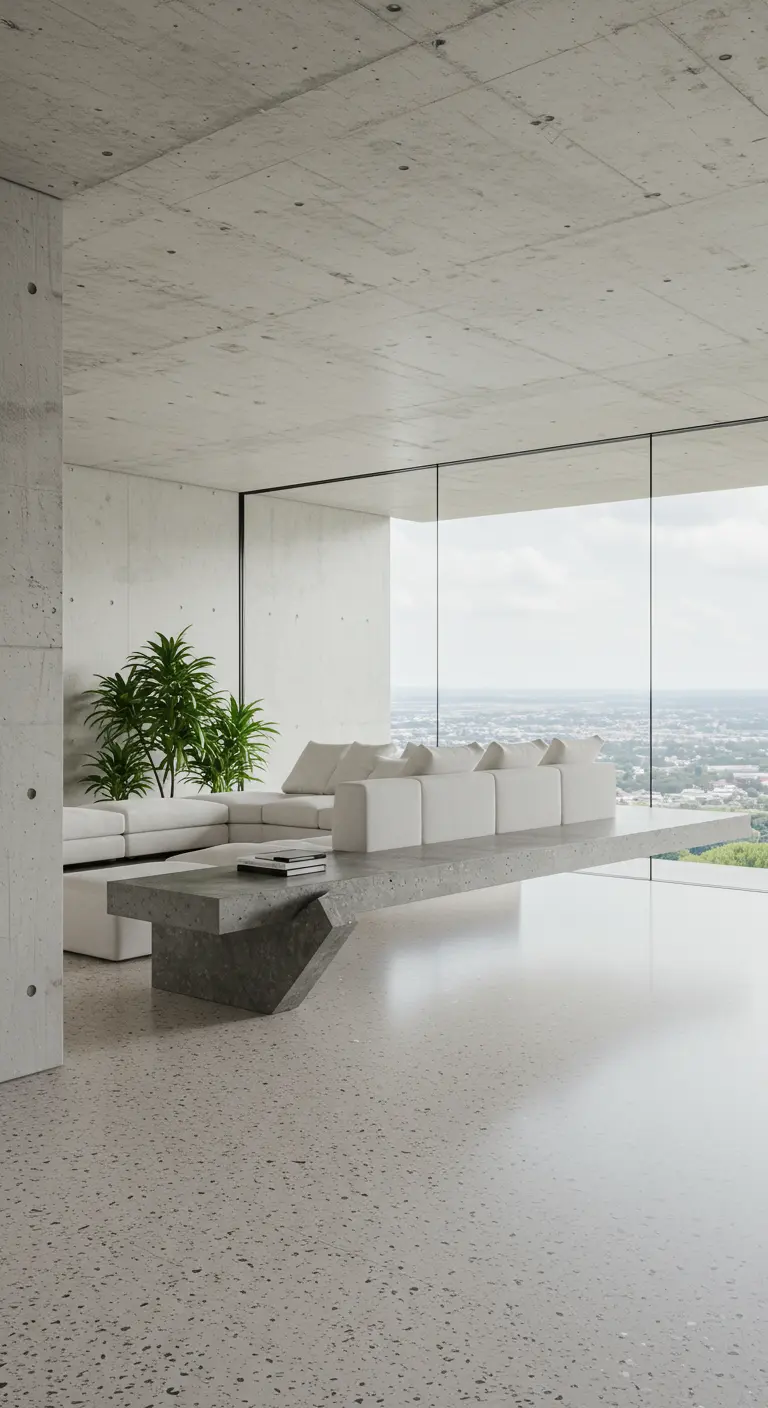
For a truly integrated and architectural feel, extend a single material across multiple functions.
Here, the concrete console seamlessly flows into the coffee table, creating a unified, sculptural centerpiece for the room. This bold gesture eliminates visual clutter and makes the space feel custom-designed and intentional.
Keep the rest of the furnishings minimal—a simple white sectional, a few green plants—to allow the architectural form to be the star.
Let the View Dictate Furniture Placement
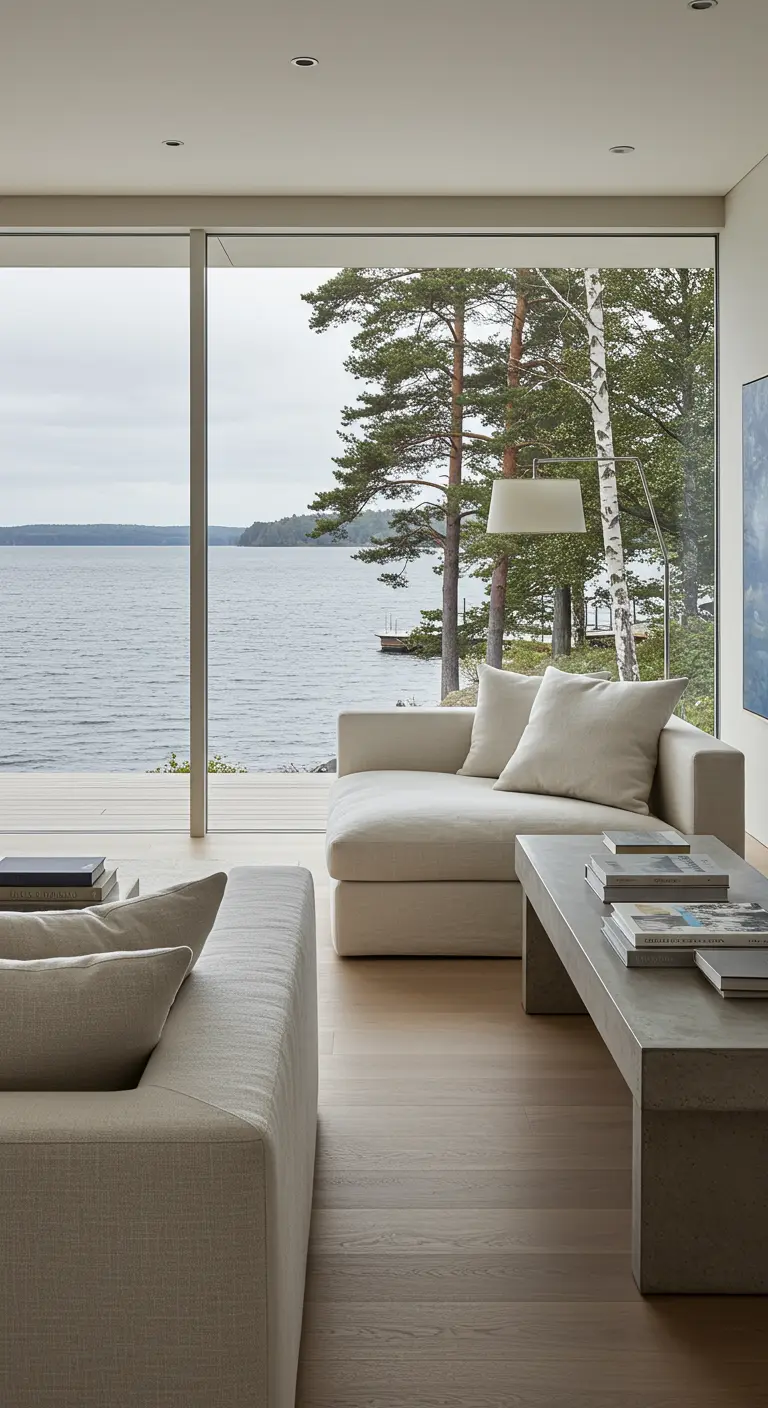
In a room defined by its relationship to the outdoors, arrange your furniture to honor that connection.
Place your seating in a way that allows for comfortable conversation while still offering an unobstructed view of the water and trees. You don’t need to have every seat facing the window; arranging them perpendicular also works beautifully.
A simple, low concrete table holds essentials without drawing attention away from the main event: the serene, lakeside scenery. This approach is central to creating timeless coastal chic interiors.
Balance a Room with a Single Piece of Art
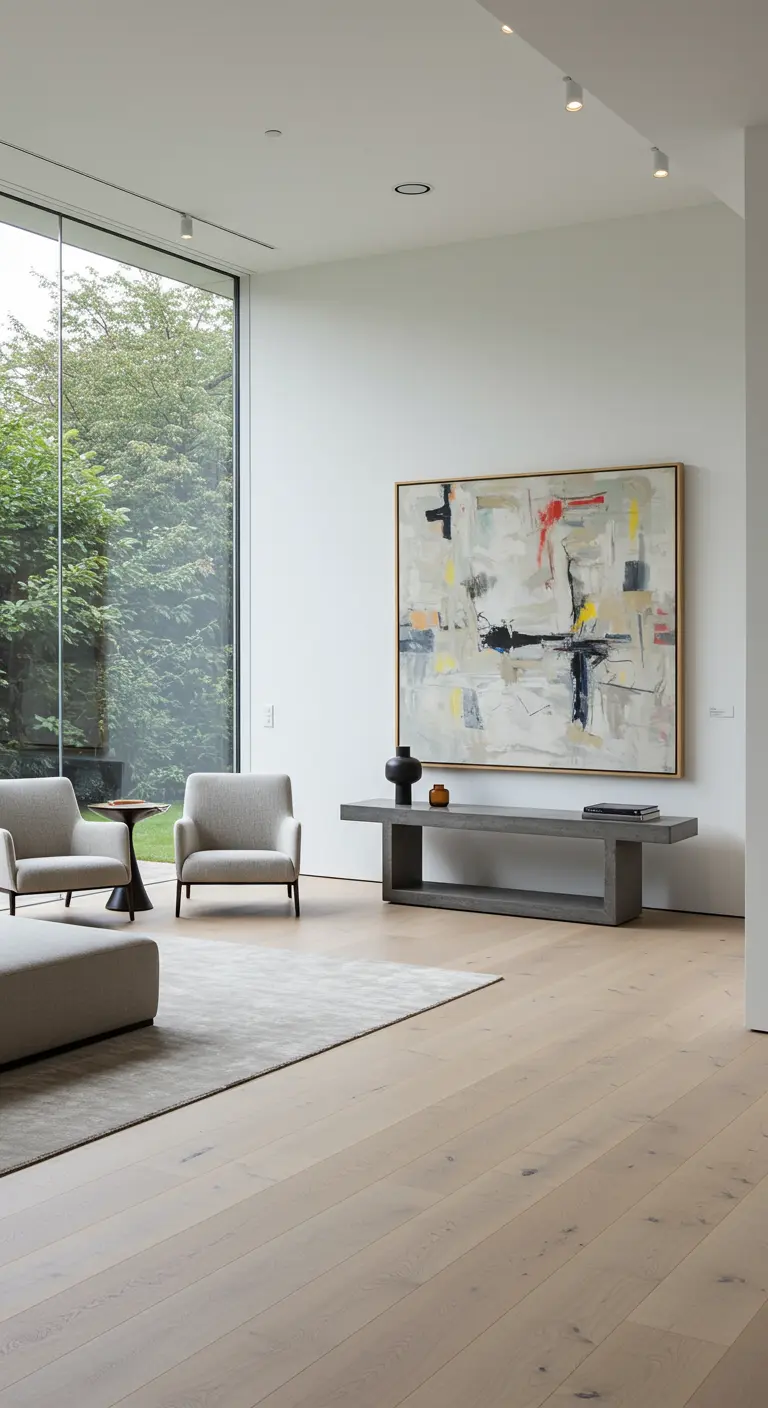
In a minimalist setting, a large piece of art can provide all the color and energy a room needs.
Select one oversized abstract painting and give it an entire wall. This creates a powerful focal point that balances the visual weight of a large window on the opposite side of the room.
The concrete console beneath it should be simple and unassuming. Its purpose is to ground the artwork, not compete with it, allowing the art to add personality to otherwise elegant monochrome living rooms.
Use a Console as a Green Partition

A console table doesn’t always have to sit against a wall. Use it to create a subtle and functional divide in an open space.
Place a rustic concrete console behind your sofa to define the edge of the living area. Top it with a row of potted plants to create a living partition that adds color and purifies the air.
This is an effective way to bring greenery indoors and add life to a room, especially when you have a view of a courtyard or ideas from a sophisticated balcony garden.
Match Your Palette to the Sunset
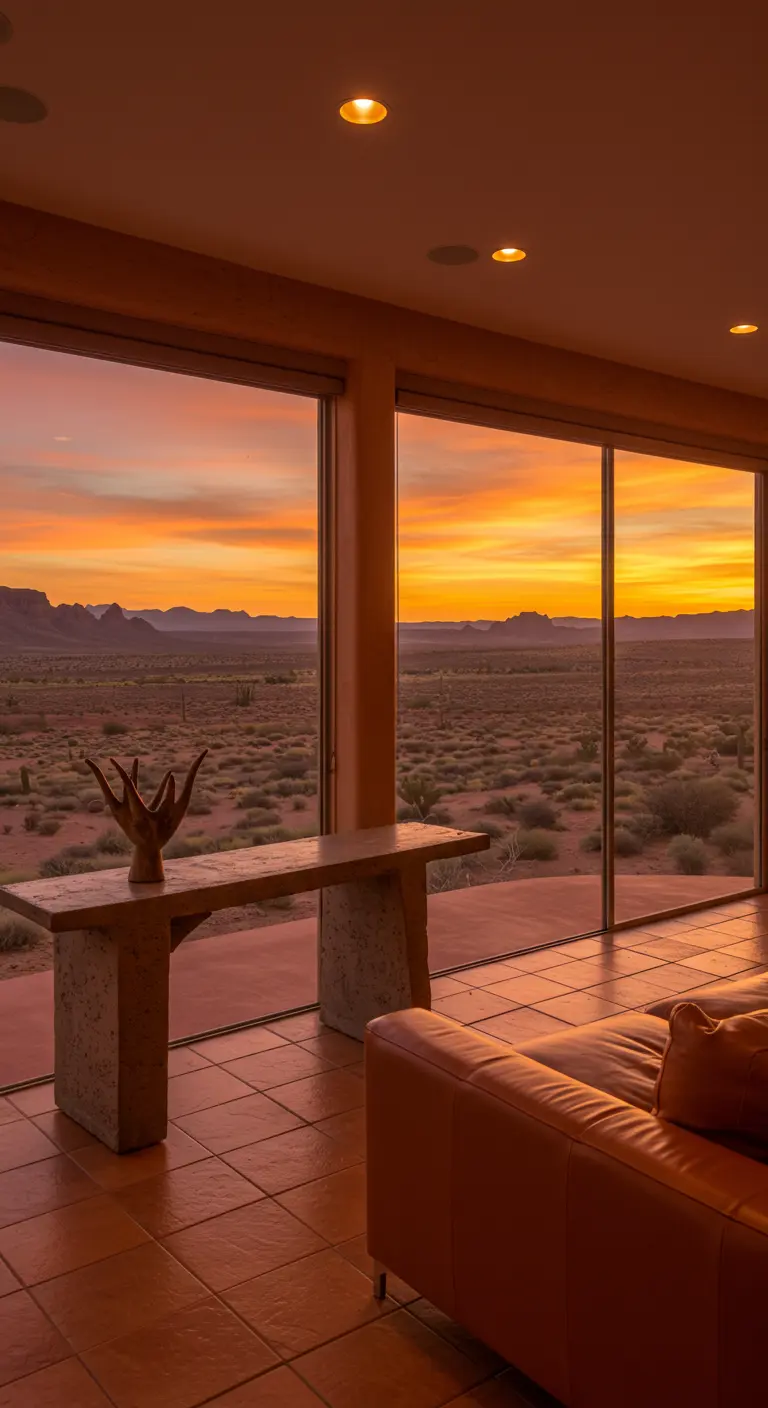
Let your environment inspire a warm, cohesive color scheme.
When your view includes dramatic sunsets, embrace those colors in your interior. Terracotta floor tiles, warm-toned walls, and a cognac leather sofa all resonate with the fiery sky, creating an immersive and harmonious experience.
A simple, rough-hewn concrete console provides a cool, textural counterpoint to the warmth, a signature of desert-inspired interiors that feel connected to their surroundings.
Use Deep Color for Grounding Accents
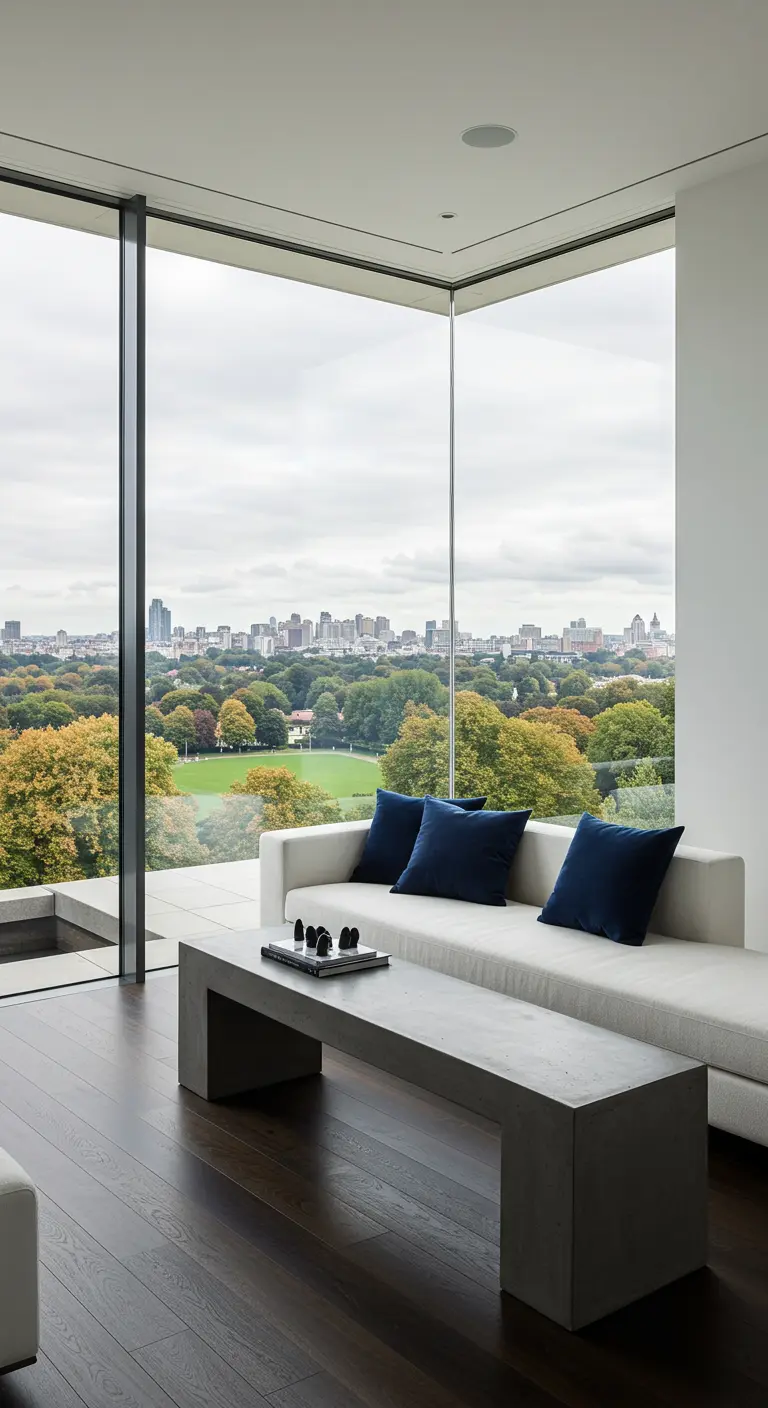
In a predominantly white or neutral room, a single element of deep color can have a significant impact.
Introduce rich, saturated color through easily swappable items like throw pillows. Deep navy or midnight blue provides a sophisticated contrast against a white sofa and grounds the airy space.
This small touch adds visual weight and anchors the seating area, preventing it from feeling like it’s floating in this high-contrast space with dark wood floors.
Create a Living Still Life with an Interior Courtyard
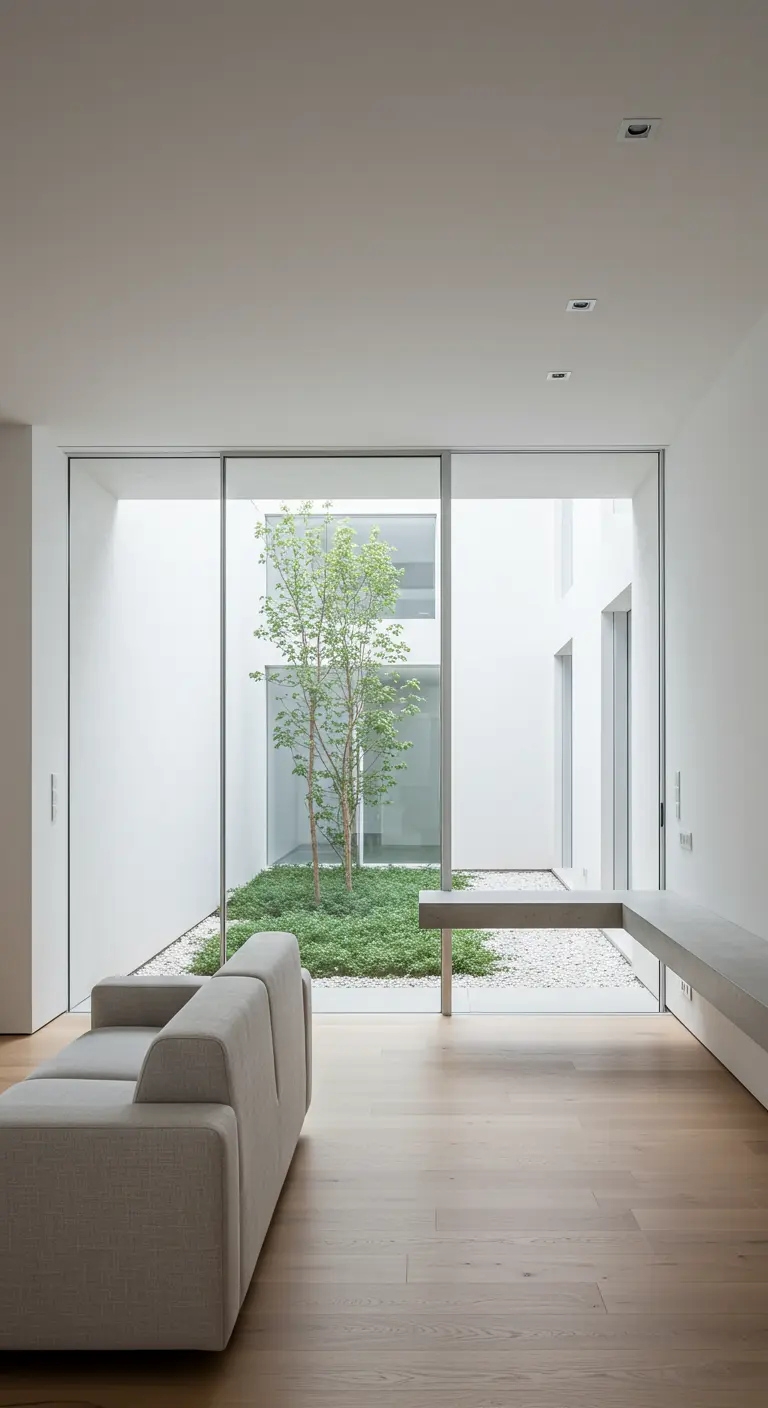
If your home is built around a central courtyard, treat it as a living work of art.
Frame the view with floor-to-ceiling glass and keep the interior extremely minimal. A clean, white palette and light wood floors ensure that nothing distracts from the greenery and light at the heart of the home.
A floating concrete console that extends from the wall enhances the architectural feel, creating a sightline that draws you towards these contemporary zen homes’ quiet center.
Layer Jewel Tones for Evening Sophistication
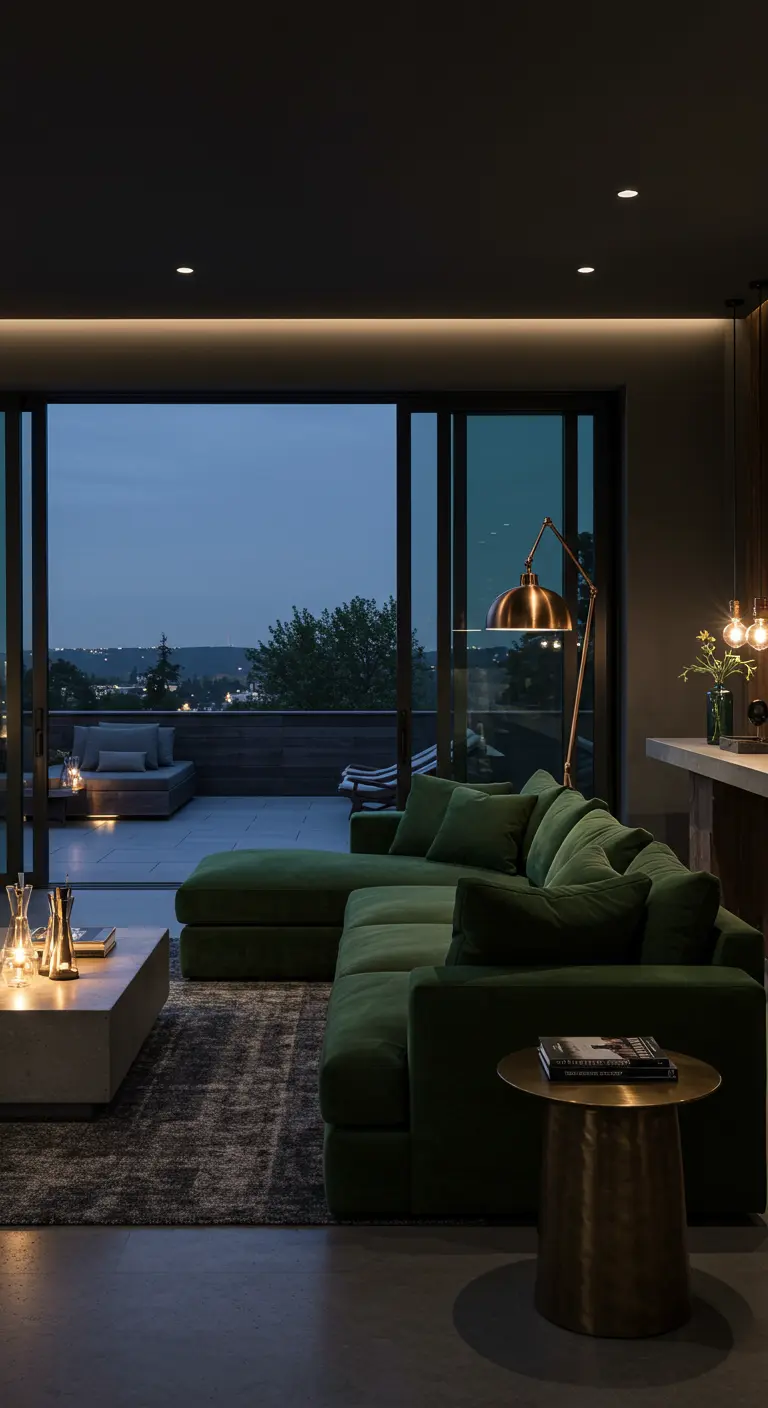
Create a rich, sophisticated atmosphere for the evening with a palette of deep jewel tones.
An emerald or forest green velvet sectional feels incredibly luxurious and inviting, especially when the sun goes down. Pair it with accents in polished brass or gold to add a touch of warmth and glamour.
Candlelight on the concrete coffee table will catch the metallic finishes, creating a soft, flickering ambiance perfect for relaxing or entertaining guests on the adjoining terrace.
Wash Walls with Light for an Airy Feel
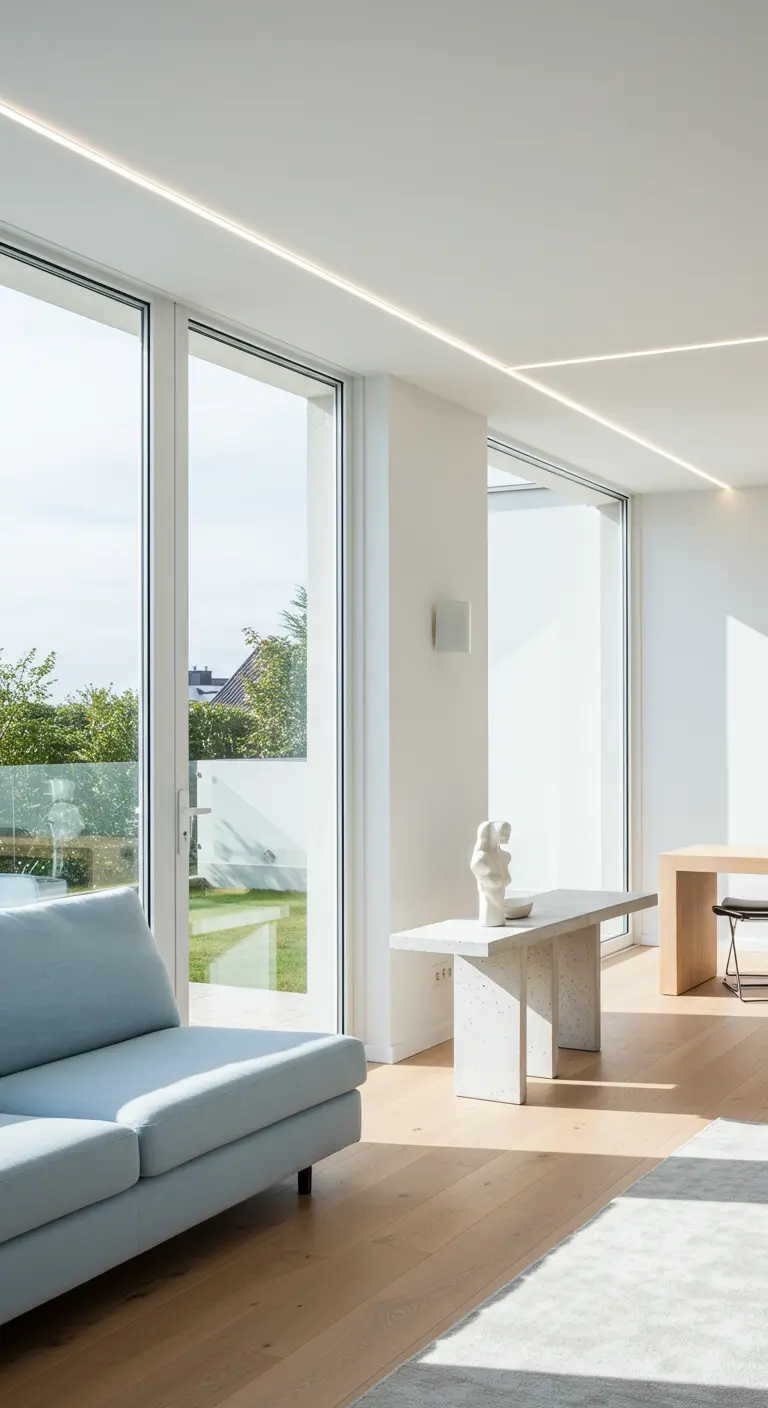
To maximize the sense of space and light in a room, think about how light interacts with your surfaces.
Instead of just dotting the ceiling with downlights, use linear recessed lighting or wall washers to cast a smooth, even glow across entire walls. This technique makes the ceiling feel higher and the room feel bigger and more open.
It works particularly well in spaces with a light color palette, enhancing the bright, airy quality you get from large glass doors and pale wood floors.
Embrace Brutalist Forms in a Barren Landscape
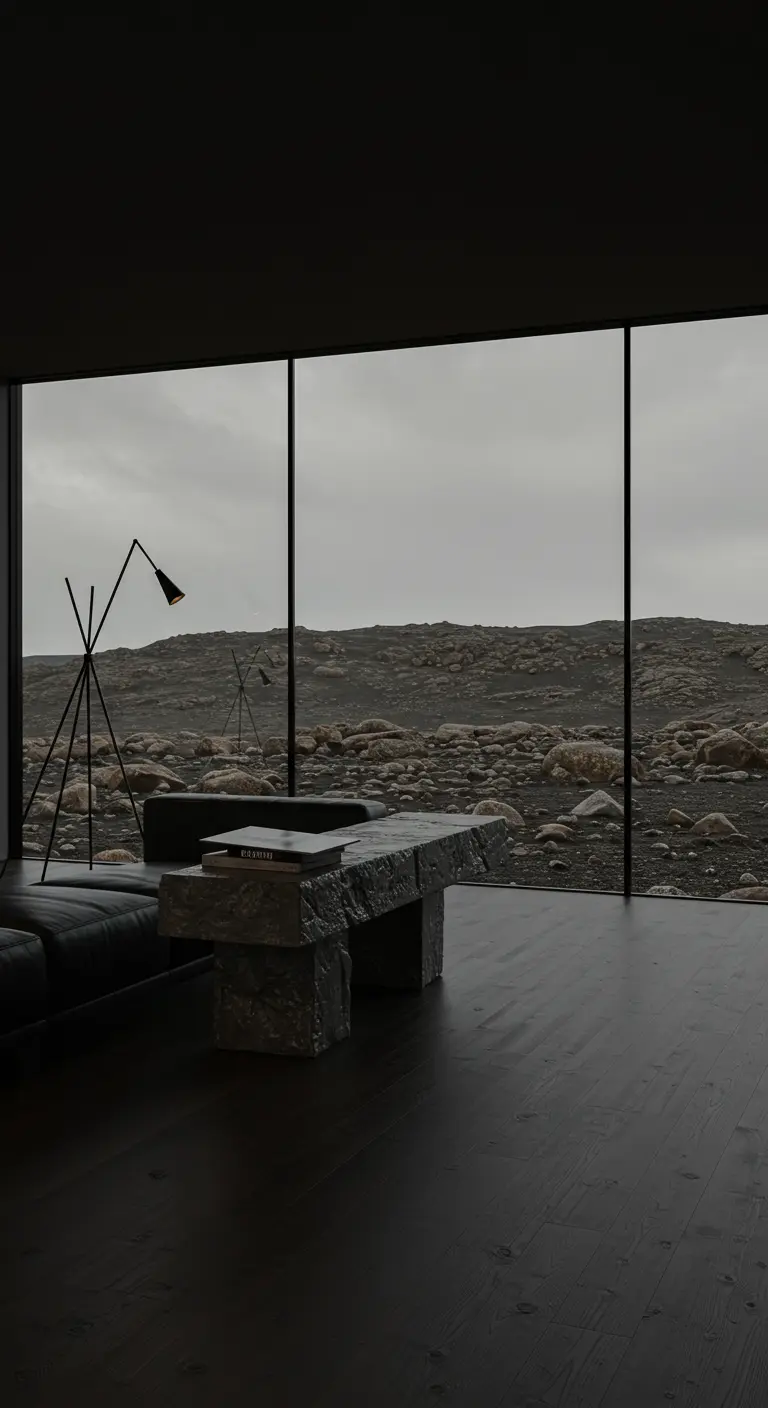
When the view outside is rugged and stark, reflect that raw beauty in your furniture choices.
Opt for a coffee table with a heavy, block-like form, reminiscent of Brutalist architecture. The raw, textured concrete feels like a natural extension of a rocky or desolate landscape, creating a powerful sense of place.
Keep the rest of the decor minimal—a sleek black sofa, a simple tripod lamp—to maintain focus on the dramatic interplay between the interior forms and the wild exterior.
Choose a Singular Bold Color in a Dark Space
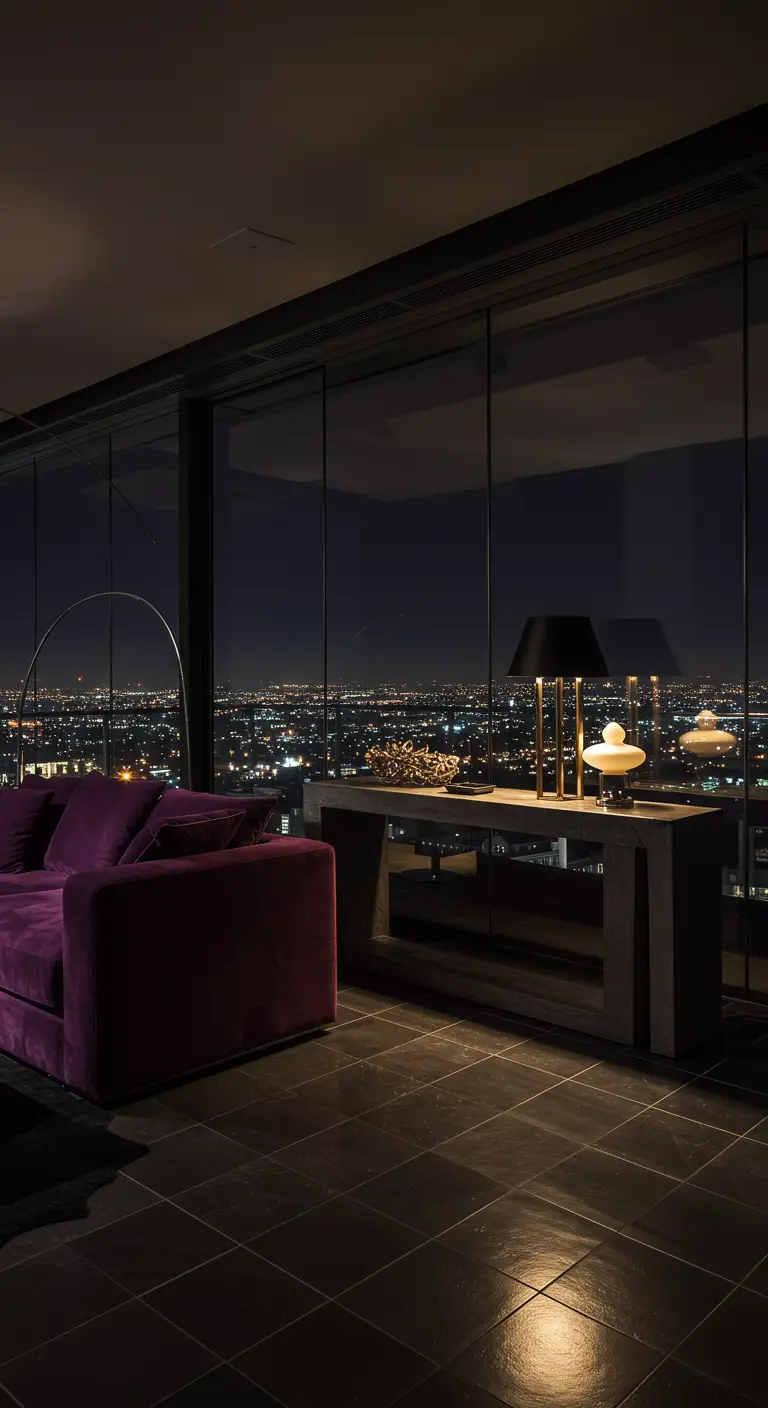
In a dark and dramatic room, a single, decisive splash of color can be electrifying.
A deep plum or magenta sofa becomes an immediate focal point against a backdrop of black tile floors and floor-to-ceiling windows showing a city at night. The rich color adds warmth and personality without compromising the sophisticated, moody atmosphere.
A collection of simple lamps on the console provides layered, ambient light that makes the velvet texture of the sofa glow.
Use a Column to Define Without Dividing
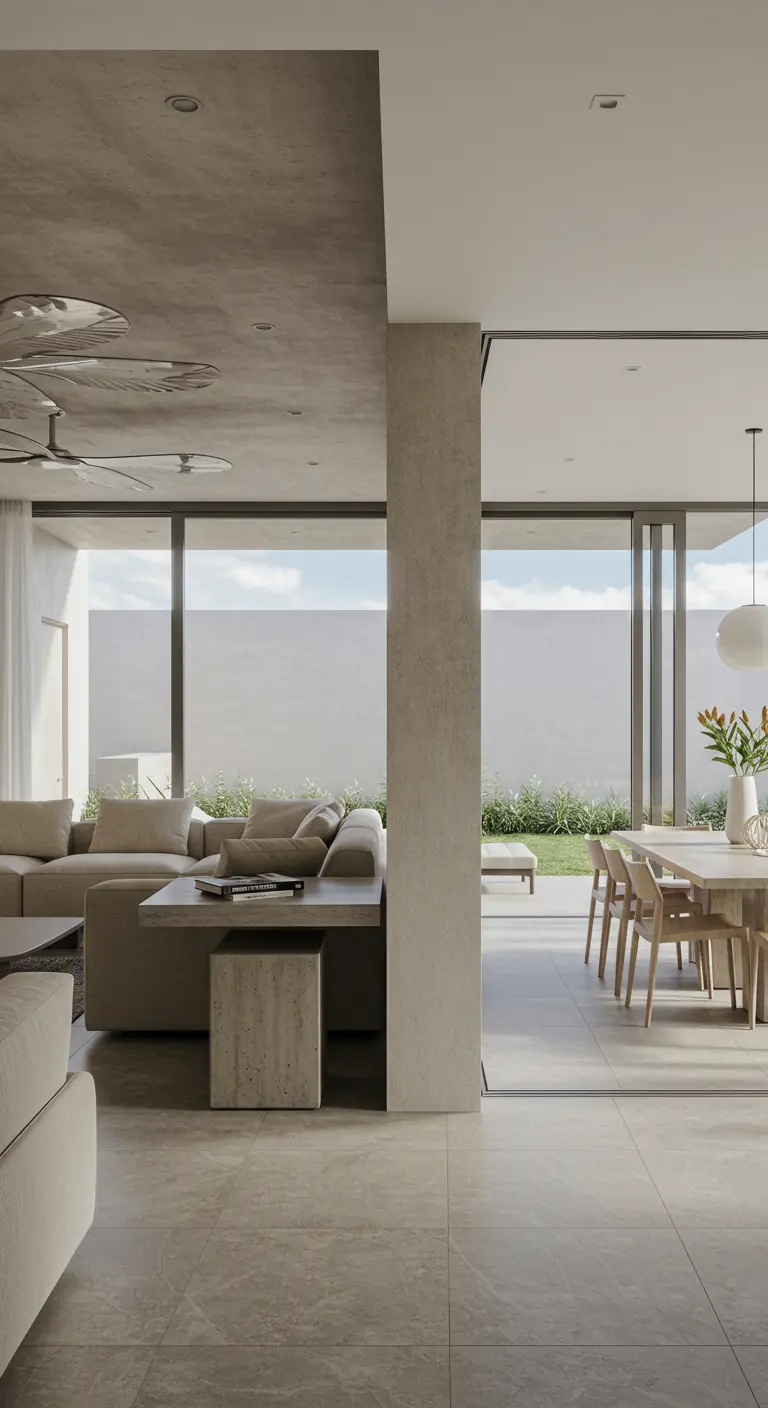
In an open-plan layout, use existing architectural elements to your advantage.
A structural column can serve as a natural demarcation point between two zones, like a living area and a dining area. Painting it the same textured finish as the walls helps it feel integrated yet distinct.
This approach maintains the desirable open flow while creating a subtle sense of separation, making both spaces feel more defined and purposeful.
Ground a Room with an Integrated Base
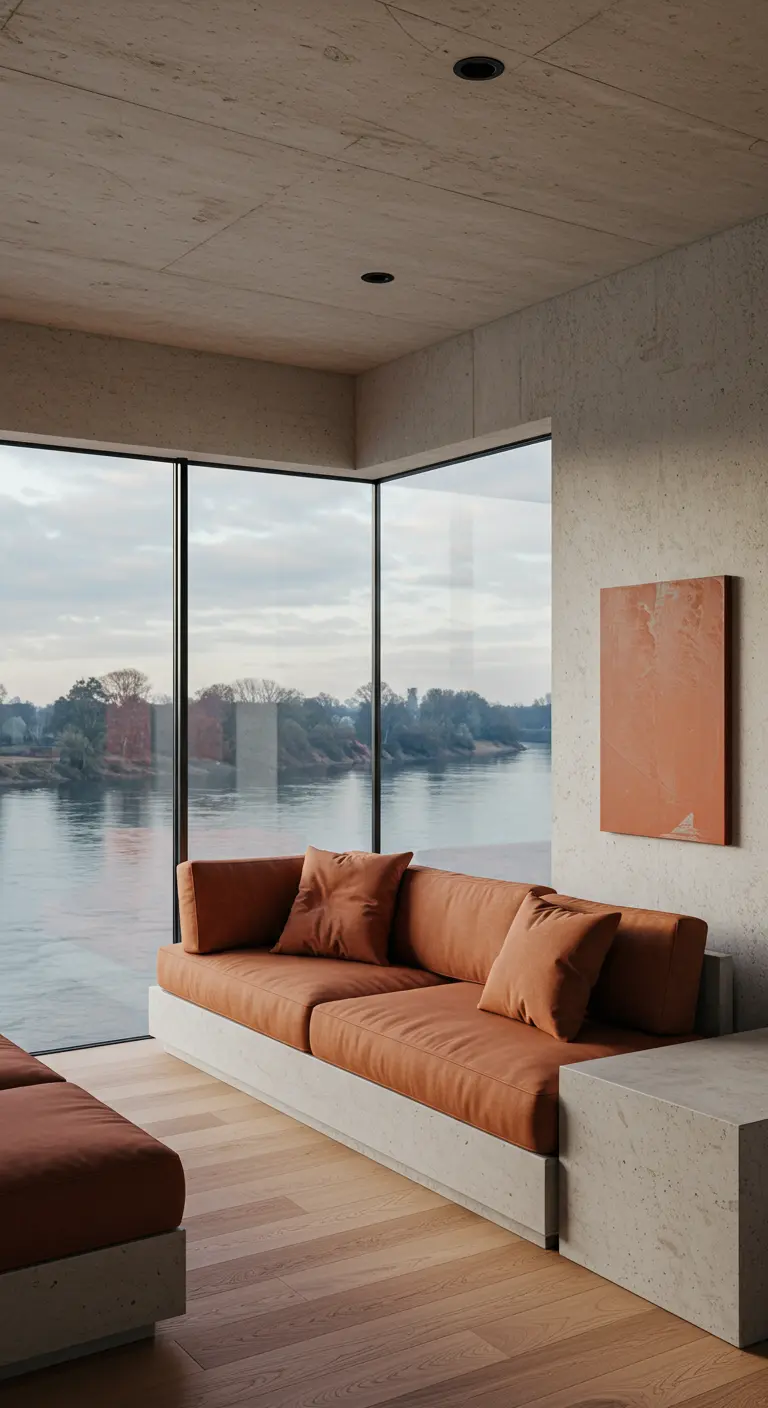
For a clean, built-in look, design your seating with an integrated base.
A sofa that sits atop a solid plinth, especially one made of concrete, feels anchored and substantial. This is a powerful design choice that makes furniture feel like part of the home’s architecture.
Choose a warm, earthy color like terracotta for the upholstery to soften the concrete base and connect with the natural wood floors, creating a space that taps into those warm earth-tone rooms trend.
Juxtapose Raw Nature with Polished Concrete
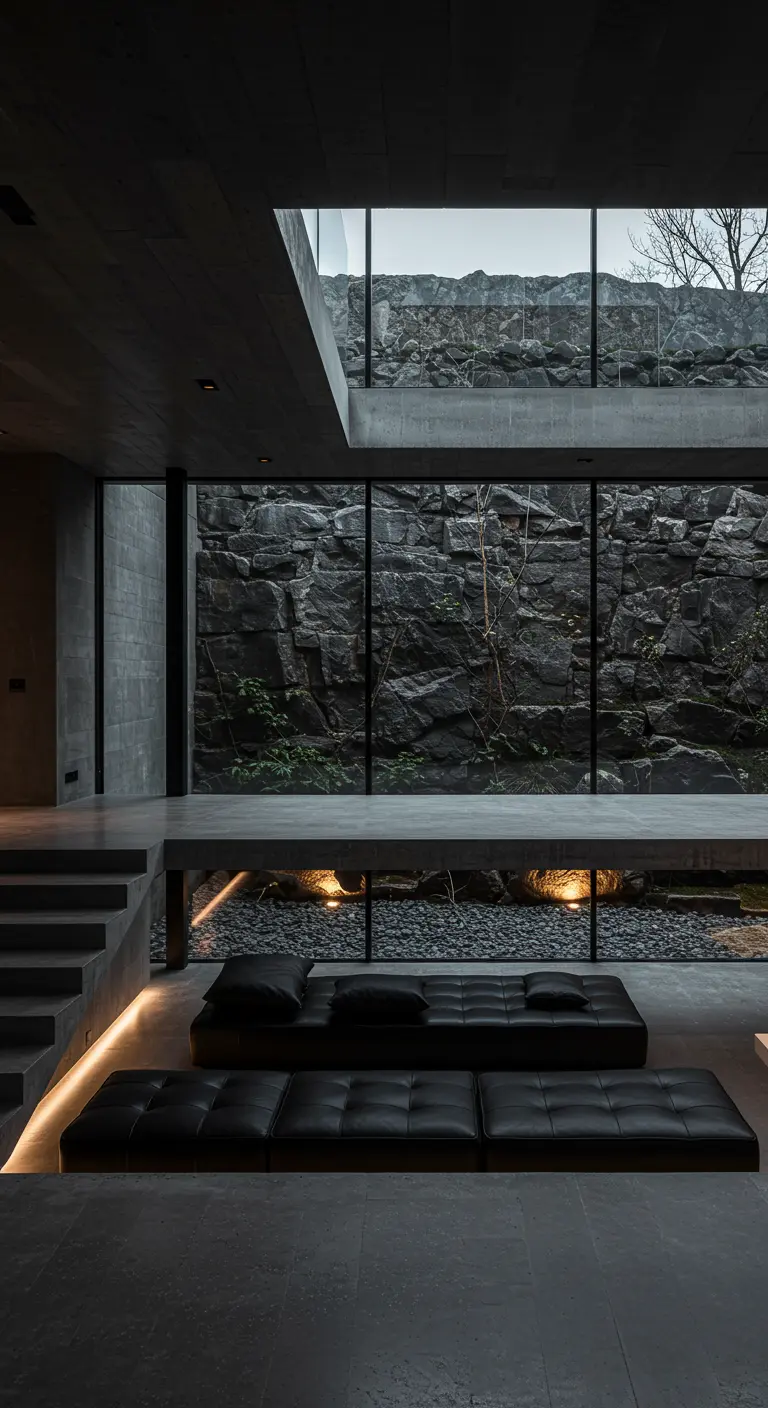
Create a powerful design statement by contrasting a rugged, natural element with a sleek, man-made one.
A view of a raw, exposed rock face becomes even more dramatic when seen from a room with polished concrete floors and a sharp, minimalist aesthetic. The contrast highlights the beauty of both textures.
Low, modular seating in a dark color keeps the profile minimal, ensuring the geological feature wall remains the undisputed star of the show, a perfect example of modern-rustic hybrids.
Incorporate Traditional Elements for a Softer Look
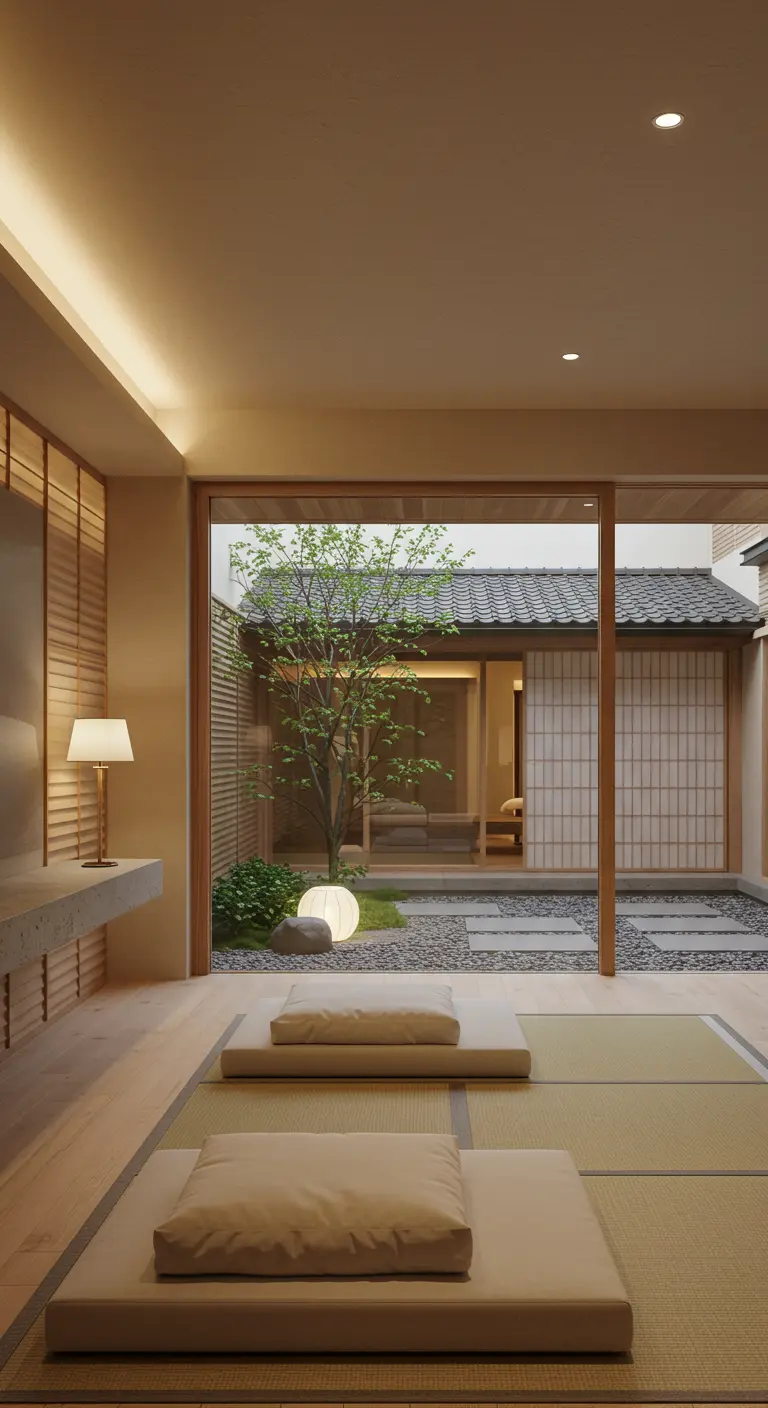
Contemporary design can feel even richer when blended with traditional touches.
Combine the clean lines of a modern layout with traditional Japanese elements like shoji screens and tatami mats. This blend of old and new creates a space that feels both serene and full of character.
The view into a tranquil courtyard garden, complete with a lantern and carefully placed stones, reinforces the feeling of a peaceful sanctuary.
Energize a Neutral Room with a Colorful Rug
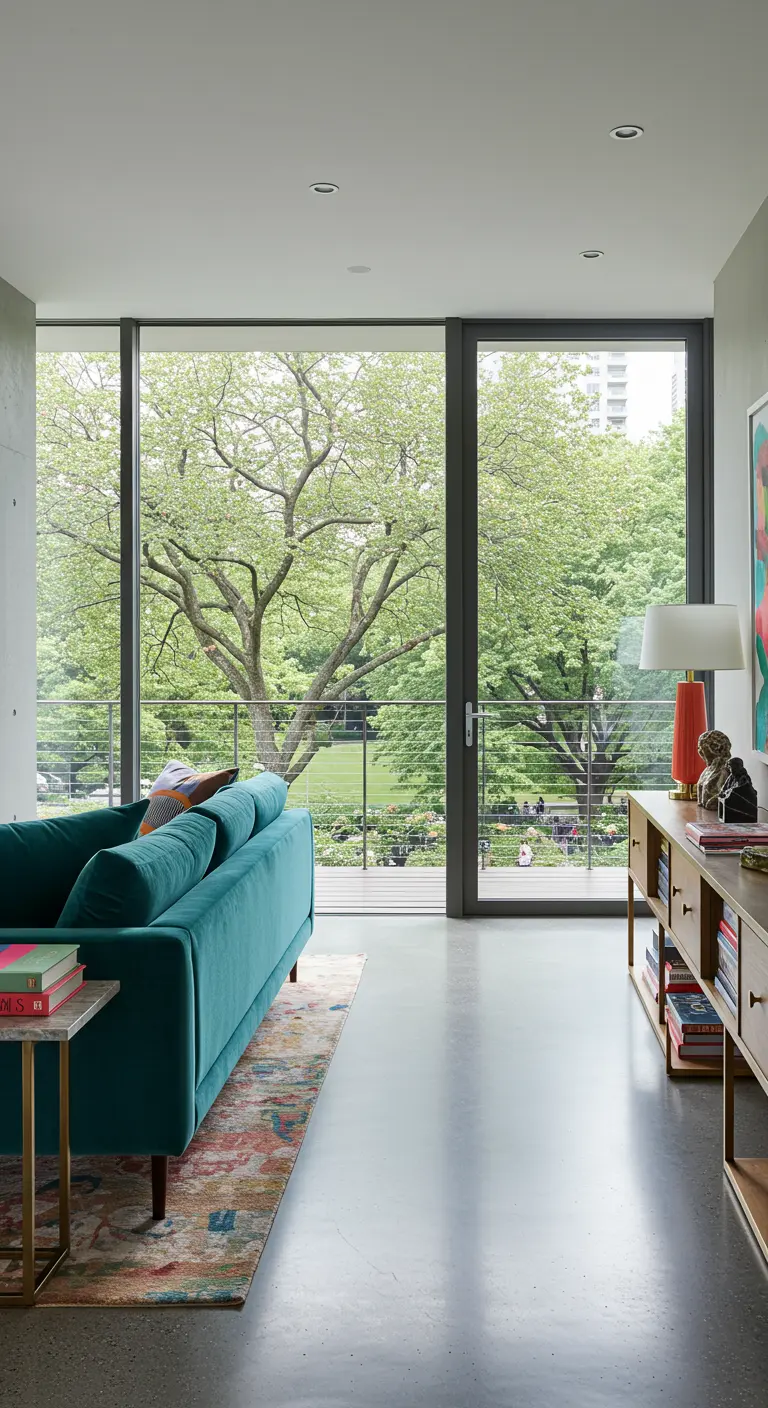
If you prefer to keep your walls and furniture neutral, use the floor as your canvas.
A vibrant, patterned rug can completely transform a room with concrete floors and a simple teal sofa. It introduces color, pattern, and personality without overwhelming the space.
This is an excellent strategy if you enjoy changing your decor, as a rug is far easier to swap out than a sofa or a wall color. It provides the perfect dose of energy in an eclectic home design.
Let Architecture Frame a Forest View
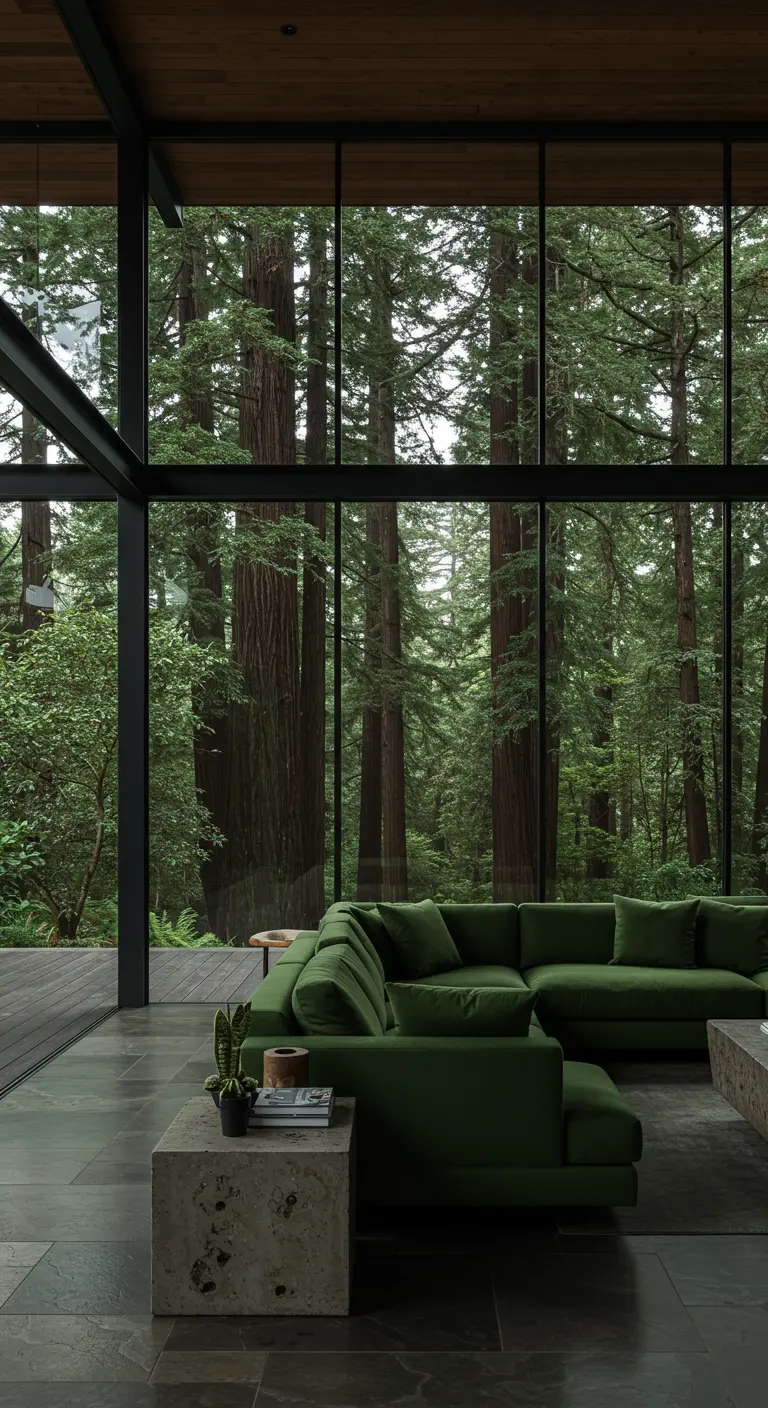
When your home is surrounded by nature, the architecture should serve as a quiet frame.
Use black steel beams and window frames to create a grid-like structure that segments the view of a dense forest. This has the effect of turning the landscape into a series of living pictures, drawing your eye to different details within the scene.
An L-shaped sectional in a deep green reinforces the connection to the outdoors, making the room feel like a sophisticated treehouse.
Achieve Serenity with an All-White Palette
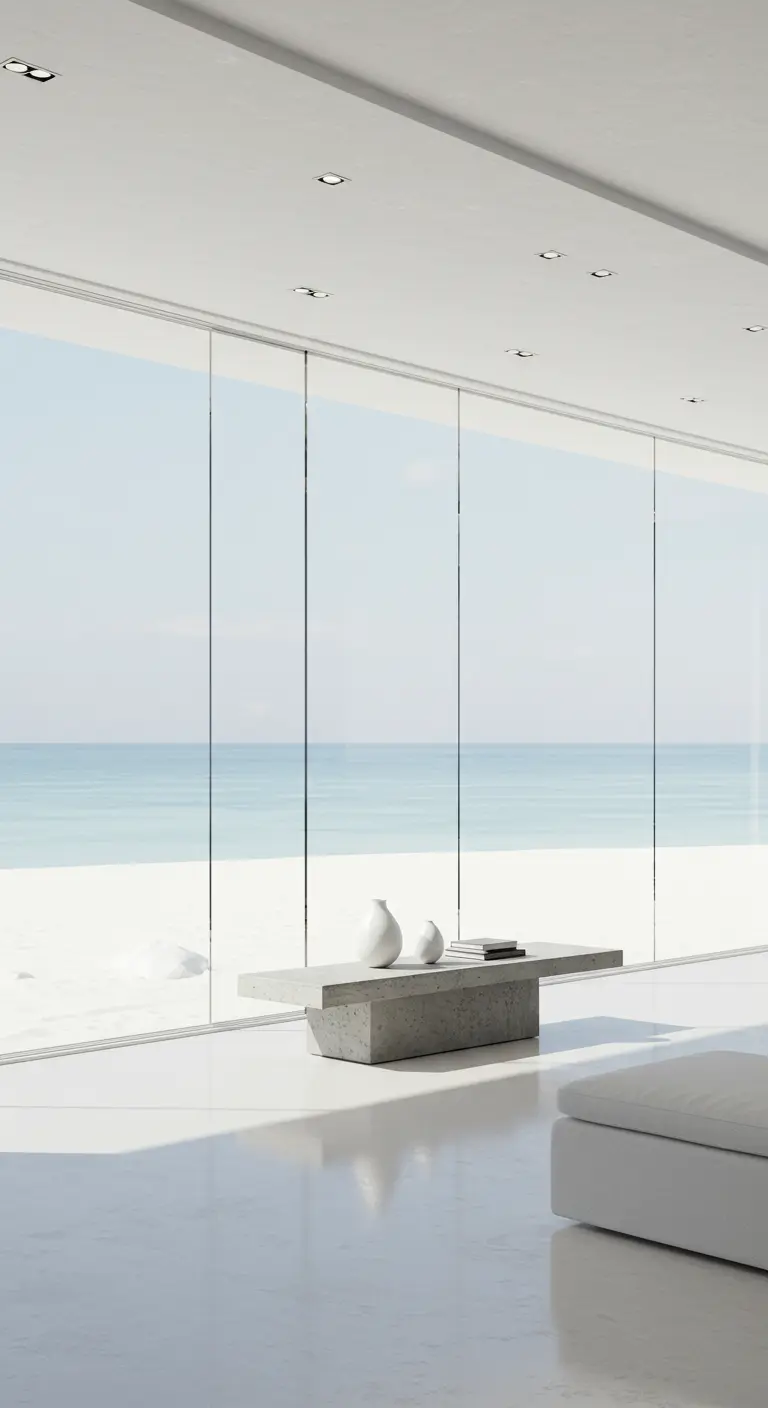
For the ultimate minimalist retreat, commit to an all-white palette.
White floors, walls, and furniture create an ethereal, cloud-like atmosphere that maximizes light and fosters a sense of boundless serenity. It’s a bold choice that turns your space into a blank canvas for light and shadow.
The key to preventing it from feeling sterile is a single, grounding element—like this simple concrete coffee table—and the ever-changing colors of the sea and sky outside the glass.
Extend Living Space with a Folding Door
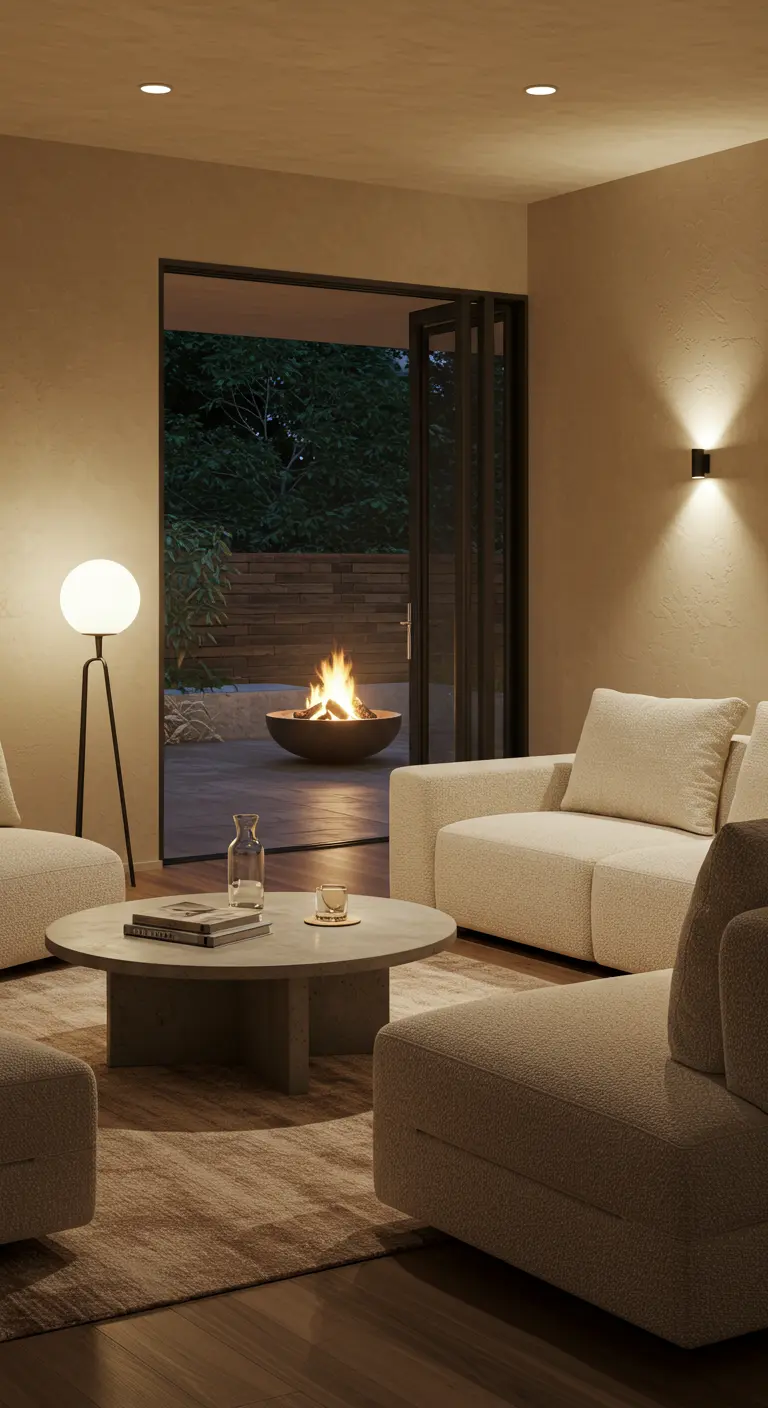
Seamlessly connect your indoor and outdoor living areas with fully retractable glass doors.
A bi-fold or accordion-style door system allows you to completely remove the barrier between your living room and a patio or terrace. This instantly doubles your entertaining space and invites the outdoors in.
On cool evenings, you can enjoy the warmth and glow of an outdoor fire pit from the comfort of your cozy, textural sofa.
Honor the View with Industrial Framing
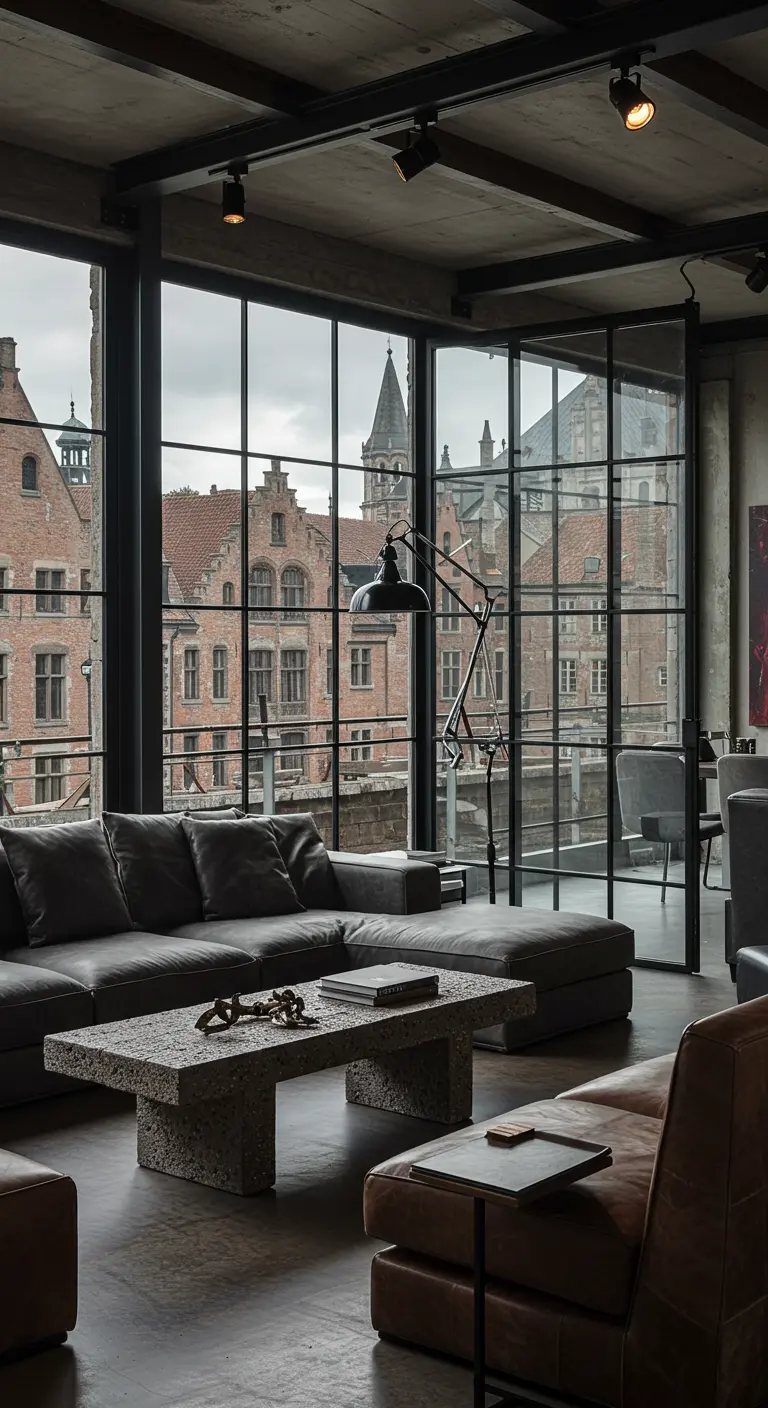
In a historic or industrial building, celebrate the architectural bones of the space.
Large, black-framed glass panels echo the industrial heritage of a loft while perfectly framing the view of the city’s older architecture. It’s a way of respecting the building’s past while creating a modern living environment.
Furnish with low-slung, comfortable pieces and a substantial terrazzo or concrete coffee table that can hold its own against the strong architectural elements.
